#also my method of explaining things is very not coherent sometimes. so it takes me a bit to really get my point across in a comprehensible
Text
I’m the type that can and will cry if think too hard <3
#random post#me tag ∠( ᐛ 」 ) |/#I’m not an overly emotional person in the stereotypical way. but I do get in my feels when thinking about life and the experience of living#I’m like. constantly explaining things to myself cus there’s never really a time or place to talk about it#also my method of explaining things is very not coherent sometimes. so it takes me a bit to really get my point across in a comprehensible#way. I’m a big thinker. I have many thoughts and ideas a views. a daily thing of mine is noticing problems#and then fixing them in my head with thought out explanations and motives and outcomes#it’s like I’m talking to someone else. much like how I format my text posts. that’s how my inner monologue is#me talking to myself is actually me talking to someone else. someone that isn’t real#anyways it’s a daily occurrence. every day of my life is spent with thoughts similar to those breaking down a movie#lots of thoughts from adhd. compulsive thoughts from ocd. overwhelming thoughts from autism. distressing thoughts from bpd#ya. this isn’t a vent I just need to like. see the thoughts in writing so I can do smth else. like eat this muffin ive been staring at for#over an hour now <3 mmmbfbg yea muffins are hard to eat now cus I had some with mold and food mold especially is a big nono for me#spend like. five minutes examining the damn thing before I even consider taking a bite. I’m very hungry an thirsty </3#when your mouth is so dry you can taste your own mouth 👍 I’m experiencing#nothing in particular. just experiencing. I wouldn’t have it any other way. I like having an experience and living#drank my tea and I had like. hallucinations of like an alcohol prep pad. I’ve been using those in my ear cus. tmi. had a pimple that’s#causing problems so mom suggested that. it burned! which means it worked so word. I’ve noticed lately that both me AND my family have been#using ‘word’ a lot. dad says we’ve been saying it but no we haven’t. if we had I’d have BEEN saying it. maybe we’ve used it before for a bit#but now it’s back. idk. I’ve said it in class on more than one occasion lmao I don’t look like the type to say smth like that but whatever#it’s like when I used to say bro after every sentence like 10 years ago lol. we’re a family of parrots we repeat eachother a lot#I started saying I love you out of no where and they started doing it too. we whistle at eachother from across the house. sing ear worms#together. quote funny things at every opportunity and drive the joke into the ground. everyone in this house is a different kind of mentally#I’ll and it’s the most beautiful clash of personalities because we’re all so annoying and we love eachother so much and also our#communication is shit because some ppl have hearing loss and another is a short fused child and some are quick to interrupt and some dont#get a word in and some just can’t explain and some can’t understand. we get there eventually at some point. we don’t get the full grasp of#how much we love eachother yet. but we’re gettin there. anyways this went into several different directions but they’re all good ones#I think. if you read all this good on you! this is my brain 24/7/365 haha ok love you
12 notes
·
View notes
Note
I dont get your tags on that fight scene post, how does a fight scene and a sex scene work the same? Theyre completely different in like every way I can think of? Im curious as to how you approach sex scenes since yours are always so good to read
Ah thank you anon! I'm glad you like my writing! I'll do my best to explain. An obligatory disclaimer though - this is all technical advice, which in my opinion is less important than characterisation and choice of kinks when it comes to writing sex that others might find appealing. I'll read the most technically inept sex as long as it has good character voice and kinks that I'm into. Sex is an inherently subjective topic where opinions often clash, so my strongest advice would be to indulge yourself and write what you want firstly. That being said, I do think the technical elements used in the right way can elevate a sex scene from good to great, and can also convince others to try a new kink or pairing if they know that you have a good technical grasp on the execution of a sex scene. And of course it's always valid to want to think about how to improve your writing!
Referencing the tags on this post
I'm going to steal a lot of terminology from that post because it's top of mind and because I need something to contrast against when I'm talking about writing sex scenes. I was good at writing fight scenes before I ever properly attempted to write a coherent sex scene (my first was my first codywan piece, which puts me at almost exactly 2 years of writing smut!) and had heard that fight/sex scenes are not too dissimilar when putting words to paper, so that was how I attempted to frame my work. That being said I've definitely improved in the last 2 years, so practise and actually writing smut does help even if you aren't actively seeking ways to improve - it just helps to have a framework to think around when looking to technically improve your writing.
So the VIOLENT method - for sex. Quotes from the original post in italics, with my minor edits then in bold. Under a cut because this got long.
Visceral: Make sure your audience feels it by keeping it grounded in sensations and emotions. Sex is an incredibly emotional event (I would argue that fights are also events of very hightened emotion, so you can take this advice for fight scenes as well) and your characters need to react to that. Whether this is a one off fling, a first time after years of pining, or a couple that's been together for most of their lives, there's going to be heavy emotions involved. What those are depends on the situation, but to me satisfying smut needs an emotional hook to draw me in to really appreciate the meaning of the actions and what's happening. To relate to a character makes the physical side of things that much more intense. That being said, the physical sensations are also incredibly important - 'he put x in his y' is flat language that may titillate, but only due to the reader's own internal associations with sex. Humans have 5 senses, put them to use! People often tend to focus on sight and touch, and sometimes to a lesser degree smell/taste (how often have you read 'he tastes like vanilla and scotch and something uniquely him) but often less so on hearing. I try to intersperse sensations from all 5 senses in my sex scenes, to grab a full breadth of sensation. This gives the reader a break too - if you're constantly saying 'he touched this, he touched that...' then they're scrambling trying to adjust to the new information instead of letting it deliciously sit and simmer. Combining senses can also give a multiplicative effect. What someone smells AND hears AND feels across their skin gives a fuller picture than one sense alone. That being said, I never use all five for one moment, and never in the same paragraph. That's another way to tire out your reader! Three senses at the maximum for each paragraph and moment, and a different combination in adjacent paragraphs of description. I would also encourage you to get gross with the details of sensation - comment on tiny things to keep your reader engaged and interested. It's likely they've read sex scenes before. The more minute you make your observations about what's happening, the more unique you'll be and the more you'll grab your reader's attention. Readers are intrigued by the new! Again, this is all applicable to fight scenes where sensation and emotion can really put a reader in a character's shoes. I can copy and paste almost the entire last 2 sentences from the main post as a final comment on visceral: Also, really critically, people are exhausted after sex. Your characters should be wrung by the time it's over, even if it only lasted for a few minutes. <- so true! Even if they're strapping 18 year olds, sex is usually a lot of physical activity. Give them a breather afterwards.
Immediate: Keep sentences short and punchy. This ties a lot into what I said in the tags on the original post, as someone who typically writes long sentences as my preferred style, fighting and having sex is when I quite deliberately attempt to limit myself and scatter in a few one or two word sentences to keep the pacing fast. Periods, dashes, semi-colons, and colons all have a real world effect on your reader's breathing. A period is a hard stop and requires a breath, while the other types of punctuation let a sentence continue and maybe only half a breath to be taken. Several short sentences in a row mean that a reader is breathing more quickly than they would otherwise be, and that leads to their heart rate increasing too. If they're already aroused (and this can mean a hightened state of awareness if they're in the throes of reading a physical fight, not just sexually aroused) then this added oxygen and heart rate adds to their physical reactions of the text and increases their connection to it, and lowers the chance of them disconnecting. You want readers to read your fight/sex scene in one sitting, because going to another tab or looking at their discord messages or whatever will break the flow of your text and their emotional connection to it. That distraction requires another hook to get them back in, which might not happen right away if you as a writer assume that you already have an involved audience due to your set up and prior hooks.
Obnoxious: I probably won't quote from the original post on this one as I think it's where the tone differs the most, even though I agree with the underlying idea. To keep the reader guessing and to keep them engaged, introduce new ideas throughout your fight/sex scene. This could be through something in the environment that they have to react to, or changing sex acts, or noticing something about the other character that they never have before. It's important that this is done deliberately though - I'm pretty sure we've all gone 'wait what position are they in??' when reading a fic before. You're looking for a new hook to latch your reader, a fresh idea that will get them asking 'what's going to happen next?' not a way to confuse them, as this will break their immersion and connection to the scene. Change things up, and if you want to return to what was happening before, then you can do that later down the line as another hook.
Liquid: Sex scenes flow. There's a definitive rhythm and momentum to a sex scene. While the characters won't necessarily have a great idea of everything happening, they WILL have a sense of the momentum around them and the way sex is making them move. Momentum and movement are going to be the key to writing an impactful sex scene and give the reader a sense of excitement. All of this! There's a back and forth in a sex scene, no matter if there's one person involved or 20. It also can be an overwhelming experiences - senses are firing, heart rate is up, every sensation can be a lot. It's okay not to write every single way that someone moves their arms or bodies, in fact I would argue that doing do would grind the immediacy of a scene to a halt with too much information. Look below on the purpose of your scene and then use that to inform the pacing - if desperate, then the back and forth should be fast. If indulgent, the back and forth is probably going to be a lot slower. Whatever it is, try to stick to one throughout the scene to avoid rapid mood shifts that could throw a reader out of their flow and make them question what's happening. Not to say that slow->fast sex can't happen (and the other way around too, and everything in between), but that shift should be recognised as impactful by the tone and prose as well as the characters on the page, to keep the readers engaged with the scene.
Environment: Where's the sex scene happening? How is everyone moving? Describe the surrounding environment. This is very good advice, and something that is critical when constructing the underlying movement and flow of the scene. Alone in a bedroom is going to be very different from people fucking in a public space. How they react to that environment can add to the emotions of a scene - do they feel safe there? Sex is an inherently vulnerable act, and doing that somewhere safe/unsafe will have an affect on the character. Are they familiar with the space? This can lead to a character knowing where condoms/lube/sex toys are, or if they're somewhere unfamiliar, being surprised if their partner/s pull out something that they weren't expecting. What's a character's reaction to that unexpected action? It can inform the tone/direction of a scene significantly. Have they had sex there before? Newness/familiarity is something that can be easily worked into a scene to ground the characters - if they know that they need to change pillows or locations because that one is too soft/squishy/rough/has a bad texture, this can tell us about a character and their desires. Sex scenes are character building! Use them to show a different side of your character/s that wouldn't normally come up! Using the environment can be hot too - if there's a risk of being discovered, or someone is picking someone else up and slamming them against a wall, or there's a mirror in the room, these can all be kinked on and add to the titillation of the sex scene. Temperature is important too. If it's freezing and they're taking all their clothes off to get sweaty with each other, that can break immersion. Alternatively that risk can again, be a part of the point of the scene if you choose to play it that way and draw focus to it on purpose.
Narrator: Who is your narrator in the sex scene? An incredibly important question! As the original post says, What a soldier notices, what a correspondent notices, what a martial artist notices, etc, are all differences. Keep an eye on how you present this. Someone who's never had sex before is going to think about sex differently to someone who goes out every weekend to get laid. A sex worker is going to approach a sexual encounter differently to someone who has only ever had sex with a man and is now looking at having sex with a woman, is going to approach a sexual encounter differently to someone who is in love, is going to approach a sexual encounter differently to someone who doesn't care about their partner at all. And these can all overlap depending on the situation. What importance is placed on speed, tone, sex acts, submission/dominance, location, etc is going to differ depending on who the narrator is. My rule of thumb is that if you switch out your narrator for a different character, the scene shouldn't make sense anymore. Everyone is different and filtering experiences through a narrator should very much impact the scene. If you can sub a different name in and the scene reads fine, you likely need to go in and add some lines that directly relate to your narrator - they're your greatest hook in drawing a reader in, and their quirks are what lets a reader connect to them!
Tactics: What does everyone want out of the sex? This question is probably the most relevant one, as it should inform the rest of the above points. The goal can be as simple as 'to get off' and as complicated as you can dream up. Keep in mind that if there are multiple participants, their goals may differ, or even clash, and this can add a point of tension to the scene that should certainly effect what's happening, whether it's directly acknowledged or not. The purpose of the sex in a scene also comes into play when setting the tone, pace, and positioning of the characters. If one of them is pissed off, that's going to read differently to if they're having desperate 'thank god you're alive' sex. If they're having slow morning sex that's going to read differently to highly visible sex happening in a public place. What you as a writer wants to convey also should factor into this. Why is there a sex scene happening? What are you showing a reader about a character? Again this can be as simple as 'to get off' but if you're using sex as a narrative device or a character building moment, then that should have it's place in the story to make sure you're getting your intent across. The length of a sex scene can also play into this. If it's three lines, that implies a perfunctory nature or lack of importance that can be leveraged in the narrative flow. This can be subverted though - trying to brush over a traumatic sexual encounter, or as foreshadowing or character building that you'd like to include without breaking the greater flow of the narrative to dedicate screen time to a full sex scene. When doing this, I usually try to have one sentence of brutally intense sensation to gut-punch the reader - depending on what emotion you're trying to convey, the content will change of course but almost everyone has an emotional response to the idea of sex. Use that to your advantage to deliver a strong and impactful line.
I hope that explanation is of some use to you! In summary: have a broad idea of what you want the sex scene to do, think about how your narrator will interact with their environment and any other individual/s involved in a sex scene, and use emotion and sensation to be as gritty in the details as you like. And like real sex, make sure to enjoy yourself too 😉
#asks#anonymous#writing#writing tips#2.5k later and I feel like this is just an off the cuff overview but anyway. very interesting to think about!
9 notes
·
View notes
Text
Self-learning: In the hand-drawn section, I learned more specifically about dog characters and practiced some poses related to walking, getting down, sitting, and playing. I then practiced the dog walking cycle animation, as I have rarely animated animal themes before, so I researched some information and observed the habits and characteristics of dogs.
In the storyboard section, I learned how to articulate the storyline more clearly, for example, by using more movement when the character is explaining something rather than just standing there talking. Then, when conveying information to the audience in the animation, I could not rely too much on words but could use supporting characters and objects that were connected to the characters to convey the storyline. Finally, about character action, an action can be divided into several stages rather than being shown in one shot, first, the action, the anticipation, and next the action take place, thus, I thought to use this method when I showed the part where the police arrest the driver.
I recreated the subplot and deleted some shots to more clearly convey the spatial coherence, as I had a lot of non-compliance with the 180 degree rule, which I corrected in post for my animation after the video tutorial. 180 degree rule means imagining a straight line connecting the two characters in a dialogue scene between them.
For the animation part, I learned some new skills about After Effects to present the animation better. Firstly, Function Fade, which is a function that allows a transition between two images so that the animation's ending is more natural, rather than switching quickly to the next image, which gives a very stiff feeling.
Then Camera Move, as my animation had a big scene where the driver had to deliver the dog, so I needed to move the frame around, I used the camera function in the software so it could adjust not only the camera movement but also the size of the shot.
About Sequence Layers, this function automatically arranges the frames of the animation sequence. This feature will save me a lot of time.
About new Composition, this is a feature that allows me to consolidate all the images into one in After Effects, as I have a lot of images to insert when animating, but sometimes when reviewing my work I need to go back and find the exact scene image and animation cycle, this feature helps to consolidate them into one, similar to a folder, and then on top of that I can use this "composite" to animate directly, for example by stretching the timeline to clip animation, and It can also find animated scenes quickly.
Finally, I learned a few things about 3D Max, such as building props for scenes and characters, including some object textures. As I am not sure if I will be working in 3D in the future, I wanted to learn some basics to develop my animation in the future.
0 notes
Note
Hey! This is an OOC question but I just wanted to say your blog is totally breathtaking, I read every single post that comes across my dash! So I was just wondering how you manage to come up with all this lore? You really immerse us into the Pokémon world and I love it :D
I’m so glad you’re enjoying it all, it’s....a lot, I must admit. Consumes every waking minute of my day just about hahah, but it brings me and you and many others some light amongst the weird stuff that’s going on in the world.
With asks I tend to sit and google some stuff to make sure I’m not using the wrong words or something, most of it I don’t really know a lot about, but have skimmed over and seem to grasp. I was also very lucky, grew up on a farm, in the middle of a jungle, surrounded by all sorts of animals and plants. I learnt respect for them early, and also a lot about gardening through various jobs and my own personal hobbies and plant babies haha. I guess I just gather up dumb facts and see how I can apply them to Pokemon. The bonus is when folks read about stuff on the blog, chances are there’s a little truth to it, and in a way it’s a lovely method of passing on information and even sometimes positive morals, after all, Pokemon is a kids thing, and for most of it I like to keep it clean, and make sure this is a safe space for youngsters as best I can, just in case.
The lore of the island itself is something I build a little every day, and have done for the last two years, I know every corner of that map, what Pokemon are where normally, and how to handle the seasonal changes, I just think in a dumb way haha, I can’t really explain why. Brain takes one shred of information and turns it into an open world map in my head. I’d love to say it’s organised, it is not, the lore planning I have done is chaos, pages of scribbles, notes, all kinds of documents all over the place, none labelled anything coherent. Tumblr and patreon get my swan form, the final products, but underneath I am paddling madly, not so impressive hahaha!
I do go a little overboard I must admit, I love writing, creative stuff is my real passion, I do a few RPs with a couple of friends now and then, and it’s a real joy for me, so I guess I just like to make it as accurate and entertaining as I can. World building is the single most fun thing for me, so I find I never know how to turn off ‘work brain’ and sit playing games and stuff, still thinking about it all. I got very lucky, I turned a childhood love of Pokemon and plants and animals into a way to live, and bring joy to a lot of people, that’s a pretty lucky thing to achieve.
165 notes
·
View notes
Text
Somebody asked a question about valid readings of literature (I have a doctorate in literature and have taught it on the college level), and i had a migraine this morning, so i’m sorry if this comes out a little coherent, but i’mma post it anyway. here’s the thing i think people don’t always get about the study of literature:
1. there isn’t just one correct reading of anything in literature
2.the bar for something being a valid reading is significantly lower than you might think.
What constitutes a “valid reading” is ultimately a personal decision by the person reading the literary criticism: do you think the person do the criticism/analysis made their case? If so, their reading could be considered “valid”, even if you don’t personally agree with it. If not, their reading might not be considered “valid”, even if you think they have interesting points. The point in writing literary analysis/criticism is to make your case well enough that people have to concede that your argument is valid even if they don’t really believe it themselves.
For instance, there are elaborate analyses of books done in Freudian analysis: taking one of Freud’s psychological theories and applying it to the work of literature. You might think Freud’s psychological theories are bullshit, in which case you might hate/disbelieve those literary readings, but if they hold together well enough, they might be considered valid.
this is also where “death of the author” comes in. because you can never truly prove exactly what the author meant to do/say with their literature, even if they tell you so! Poe wrote an essay on his writing technique, in which he claimed that when writing The Raven he started out with the bird being a parrot and then decided a raven would be more metal and better in keeping with the tone of the poem. And a huge number of literary scholars (including myself) think Poe was probably talking out of his ass there, and just knew/learned that ravens could be taught to speak, and was like, “Hey, that gives me an idea for a HELLA gothic poem,” and went and wrote it. And then later folks were like, “prove to us that you’re a REAL writer? What’s your method?” and poe was like, “Oh yes, I think everything through very clearly and rationally” rather than tellign the truth and being like, “this sounded rad so i wrote it that way because of feels.”
Also, sometimes people will write something that, for instance, reveals their subconscious beliefs about race. They might not realize when they’re writing it that their writing does that, but other people can point it out later, and that can be a valid reading. Sometimes the author doesn’t recognize the ways in which their unconscious beliefs and prejudices manifest themselves in their work. And in those readings, it really doesn’t matter what the author meant: it just matters what the work SAYS. Or might be read to say.
There’s also the fact that we can never truly get inside the heads of the original audience of a work once enough time has passed. it’s great to learn something about, say, Elizabethan English culture and use that to make a reading of something Shakespeare said, and those can be totally valid (and very interesting!) readings. but at the same time, one of shakespeare’s plays is going to feel completely different to a modern audience than it did to an audience at the time. For instance, changing attitudes toward race and rape and sexual equality can really change the way we read a work that’s only a couple of decades old. A reading can explain the way the original audience might have read it, or the way we read it now, or both. All of those can be valid readings, as long as it takes things like changing audience into account (for instance, if there’s a concept that’s brand new in world thought, and you’re trying to apply it to a four-hundred-year-old piece of literature, you should probably mention somewhere in your analysis that people didn’t think this way at the time the work was written. Soemtimes you can get away with not saying these disclaimers directly; other times you need ot make them. No hard and fast rules.)
In order to make a valid reading, you should make sure that you have lots of evidence from a text to back up your reading. If possible, you can support your reading with outside sources (explanations of historical cultural beliefs, for instance). You can base your reading on a theoretical framework (eg Freudian literary theory, Marxist literary theory, feminist literary theory). If your argument holds together, doesn’t have huge holes in it, and satisfies your readers, they may declare it a valid reading.
an example:
on the surface, Romeo and Juliet can be read as a dramatic tragic piece, made to move the audience, who hopefully may be identifying with romeo and/or juliet. the story is sad, we’re sad for them, we enjoy having a good cry and the catharsis that comes with it. that’s a pretty basic interpretation.
i’ve seen another interpretation, from John Greene on Youtube, that argues that Shakespeare set the play in Italy because the English at the time considered Italians to be hot-headed and vengeful and they’d never believe a revenge plot of this kind if it were set in England. And also that Romeo and Juliet were made to be teenagers in the story because only teengers would do something this insane for love, because teenage emotions are extremely heightened, and that part of the reason this is a tragedy is because NONE of this had to happen if somebody who wasn’t a teenager (or apparently wasn’t Italian lol) had stepped in and managed to impart some reason to everybody.
Both of these reading are totally valid. Both of them can also co-exist: they can both be correct at once. I can be feeling bad for romeo and juliet and be sad for them, and at the same time, part of my brain can be like, “Holy Fuck, Friar Lawrence, what the fucking fuck made you think that was good advice??!! also, kids, stop what you’re doing for five seconds and remember that you’re fifteen and thirteen and the world isn’t ending i promise.” Not only are these both valid readings, they can both be valid at once. they are not mutually exclusive.
My post-migraine brain doesn’t know whether any of this made sense or not, and honestly, part of the problem is that there are no hard-and-fast rules about literary analysis. but i hope that helped?
#literature#literary analysis#literary criticism#i just had to go back and edit this#because i realized the post literally ended in the middle of a sentence#migraine-brain is a thing
12 notes
·
View notes
Note
Ok, I've been sitting on this awhile (mostly because I worry that my reaction stems from personal feelings, rather than the content of your actual post) but while I agree wwx's arc is not ABOUT trauma, I do think he IS traumatized. Like, he has a literal phobia of dogs due to childhood trauma w/ dogs??? And I take issue with the idea that someone cannot be simultaneously traumatized and resilient/always smiling. I mean, refusing to process and deal with negative experiences and emotions because if you can choose to be happy, why would you choose to be anything else can actually be worse for you than just letting yourself be sad for a little bit. People are supposed to feel the full emotional spectrum and refusing to acknowledge sadness doesn't make someone not actually sad. As someone with a sunny personality who almost always let's things roll off my back, that doesn't mean I don't have trauma to deal, it just means it presents itself in different ways than someone with a different personality. Everyone is entitled to their interpretation of characters, so I'm not trying to say yours is inherently wrong, my point is more that it's not a guarantee that having a happy personality = not traumatized, especially when there are other things to point to them being traumatized.
Hi anon,
I think it’s important to consider the context in which I addressed fandom’s discussions on “WWX’s trauma/ptsd,” which in this case was a response to people explaining many of his behaviours during his first life, from the Sunshot campaign onwards, as resulting from trauma. I never meant to suggest that WWX could not experience trauma, at all, especially since in an earlier post about my thoughts regarding the trauma argument I did highlight that we get in the narrative an example of how WWX reacts when faced with trauma through his cynophobia (although I can’t find that post because it I can’t remember exactly when I shared it 🤷♂️). It was more to oppose the ideas that (1) events are inherently traumatic and thus that because these distressing things happened to WWX, WWX must be carrying trauma from them (because if we’re going to use psychology/psycho-analysis for literary analysis, it might be good to consider that the perception of trauma in psychology is not that) and (2) that there are no other narrative or character explanations for those behaviours that are not rooted in trauma.
In this case, I think the novel makes it clear that while WWX is of course affected emotionally by the events, the things that people point to as resulting from trauma are actually tied to his cultivation methods and him losing control. I do feel like that interpretation is coherent with the authorial intent, which seems to be confirmed in one of MXTX’s interviews. To share here the most relevant possage:
[WN killing JZX] was perfectly an example of how Wei Wuxian was losing control. The more he lost control over his demonic cultivation, the more likely he was going to receive a backlash.
Of course, authorial intent is not the end-all-be-all of everything, and, certainly, there exists probably as many interpretations of a text as there exists readers (or, in the case of MDZS, we should also probably include all the people who haven’t read it but still have an opinion on its content). However, my brand of meta focuses on reading the text closely and challenging interpretations that are floating around in the fandom space against the text itself--the narrative, the characterisation, the themes, the symbolism. To say, ‘perhaps some people tend to associate a certain behaviour with a specific thing (ie, emotional volatility with a traumatic response to a distressing event), however does it seem like the text wants to lead you toward this interpretation? Does the text provide other story-specific explanations, some of which might actually be more cohesive and coherent with the narrative/characterisation/themes (ie, emotional volatility in this specific instance is a side-effect of the influence of modao on WWX and his loss of control)?’ That doesn’t mean I’m always right, of course I’m not. But I also do not prescribe to the belief that every interpretations are equally credible. That is, I do believe that people are entirely free to interpret a text however they choose, even if it means reappropriating the text and completely ignoring parts of it or mentally rewriting parts of it; all the same, I do not think these interpretations are particularly helpful when it comes to understanding and analysing the text itself (though they are interesting in that they help understand how a work is received by certain demographics). So, yes, sometimes I will write posts that aim to contrast certain popular interpretations with what can be gleaned from a close reading of the text.
In addition, let me clarify that when I contrasted “resilience” with “trauma”, it was not in terms of personality trait so much as a reference to terms used in psychology: where how a person processes a distressing event through a trauma response or through resilience.
As for the “smiling thing”, I think it is important to remember the context of the discussion, where I cited the novel:
Jiang Yanli said that he was born with a smiling look. No matter what unfortunate thing happened, he wouldn’t cling on to them; no matter what situation he was in, he would be happy. Although it sounded a bit heartless, it really was not bad.
In the original post, I did reframe this quote by acknowledging that yes, smiling is not an inherent proof that someone has never experienced trauma.
To me, this is a clear move from MXTX to position WWX as the kind of protagonist who can face a storm and keep his smile on his face. I can imagine that some people take it perhaps as a subversion, as the text telling us that WWX is weathering it all with a smile but underneath it all he is just a bundle of unaddressed trauma. And that’s certainly a possible interpretation, but it’s not mine. In this case I think the text is being straightforward. What we see of WWX also seems to support that: the way WWX just rolls with being brought back from the death, how easily he finds a way to adapt to things, etc.
That was more of an acknowledgement that wrt this topic, the novel seemed to have chosen a very straightforward approach or, in other words, to choose to not be That Deep. The smiling disposition here is not part of a psychological diagnosis, but simply a story/characterisation shorthand. I also never suggested that this meant that WWX is not affected by events: “ My point is not that WWX is unaffected by the things that happened to him or the things he’s done during this portion of his life: of course he is! Especially as they are happening to him, or when he is still stuck in a very difficult situation. But I don’t think his character and his arc is about trauma”. I think that nuance is important.
At the end of the day, I do not want to force people to change their minds. I only use my free time to over-analyse a novel and sometimes try to challenge people to reconsider their initial interpretations of the text or their approaches to literary analysis more generally.
30 notes
·
View notes
Note
Hello there. I have this thing where I’m naive when it comes to social interaction. I take what people say at face value and sometimes even assume they’re telling the truth, and this is despite considering myself a skeptical person. I don’t know their intentions. I question, but it’s just that if I don’t see something that is logically invalid then I can’t detect any BS, and waiting for a contradiction to pop up is unviable for most all interactions. 1/3
[con’t: When other people give their input on it, however, I find myself swayed by their opinion and how obviously much BS there was. My opinions on which joke is funny, which action is inappropriate, or indeed what others’ intentions are usually come from the outside, unlike my opinions on what is systematically coherent or not. This seems like a difference in Fe and Ti processes. Anyway, I found myself put into unfavorable situations by others because of this weakness, and Im wondering whether type development has anything to say about this, since my wait-for-a-contradiction method is inefficient, and I get screwed over long before that happens. I’m an INTP.]
1) You’ll have to explain to me why you believe that you are INTP. Ti is a judging function, so Ti doms are constantly formulating judgments. Yet you basically describe yourself as very lacking in judgments. Also, automatically taking people at their word is usually a sign that Fe comes first. Something doesn’t add up.
2) Ti doms implicitly know to improve their abilities through learning systematically from their mistakes. INTPs, being N, don’t tend to take things at face value. They are naturally adept at generating theories and solutions on their own and improving on their own. Yet you do not exhibit these strengths and characteristics. Something doesn’t add up.
3) What makes a person “bad” is not whether they have bad logic - the moral and the intellectual are separate and distinct realms, but you conflate them. The main problem you’re describing is poor social skills, which may or may not be related to type. There are many possible contributing factors to poor social skills, some easier to resolve than others. As far as I can tell, you are unable to construct a viable theory of mind with which to understand people. But the underlying cause of this problem is unknown so far. It could be something as benign as you being too young, too inexperienced, or too sheltered from social interaction. It could be something as serious as undiagnosed autism. You want to attribute it to inferior Fe, but the first two points put inferior Fe into question. Until I understand why you use Ti+Ne so poorly and I’m certain that you aren’t mistyped, I can’t provide type specific suggestions. In other words, it’s not clear that cognitive function dysfunction is the main cause of your poor social skills.
Unfortunately, there isn’t enough information for me to give you a proper response. Without identifying the underlying cause of the social skills problem, it’s difficult to formulate solutions. You’ll have to narrow down the possible underlying causes first.
7 notes
·
View notes
Photo
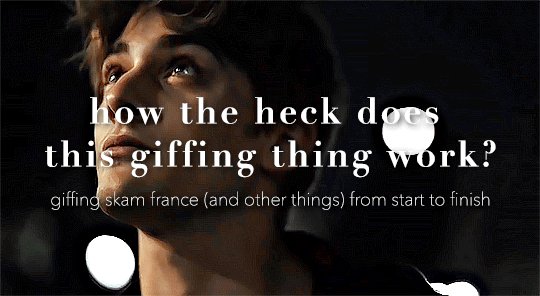
so here’s my disclaimer: I hardly know what I'm doing. This is my glued together homemade giffing method that I’ve created over months of just random experimentation and bits and pieces from all kinds of tutorials. there are probably better or more correct ways to do a lot of these things! this also isn’t a completely universal tutorial, some of the specifics are geared towards giffing skam, specifically skam france.
I gif in photoshop cc 2020 on a macbook. Some things like keyboard shortcuts and little things about the photoshop interface will probably vary if you are on a pc/ other version of photoshop!
this is very long and very unprofessional, but I hope there is something in here that someone will find helpful!
we’ll be going from this:
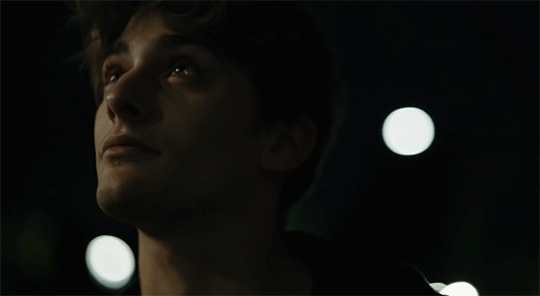
to this:

up to date as of October 25, 2020
downloading clips
selecting what part you’re going to gif
cropping
my action for resizing, converting to a smart object, and sharpening
coloring
exporting and setting the delay
tldr tips
1. downloading clips
4k video downloader (which you can get for mac or pc here) is great for things posted to youtube, especially from skam france because all the clips are on their youtube with no weird geoblocks or anything! it’s really easy, you just have to open the clip in youtube, copy the link, and go into the program and hit paste link. I like to put on smart mode first and set the destination folder so all my clips go into the place I want.

There is a 30 video per day download limit, so if you’re thinking you really want to gif lots of stuff from the show, and want a big chunk or a full season it’s definitely worth hunting for a mega or google drive with full episodes to download because it’s just less hassle! I might come back to this post later and compile a list of all of those, but for now if you type “[remake] no subs google drive” or “[remake] no subs mega” into a google search, you’ll probably find something! the all of skam website has no subs for several remakes, but not all!
If you don’t have enough space on your computer to be keeping full seasons, I know there are methods to get screencaps without having to download (generally for giffing movies and regular tv I think this is a common method), but I’ve never done it so I’ll redirect you to this tutorial that explains it! you should probably just go there for the whole thing tbh it’s much more coherent than this, but I digress.
2. selecting the piece of the video you want to gif
now that you’ve got your episode or clip you’ll want to just open it in photoshop! if you go the screen capping route the way to do that is a bit wonky, so you can keep following the tutorial I linked above and join back in here at coloring if you like!
if the timeline at the bottom doesn’t pop up automatically you can go to window > timeline and turn it on! now you can use the scrubber bar thing to find the moment you want to gif!
The advantage of this over screen capping is you can scrub with more precision. the arrows circled in blue below let you jump only one frame, where in screen capping I'm pretty sure you can only go by ten second or one minute intervals.
I usually drag the scrubber as close as I can to the start of the shot/moment I want to use, fiddle with the arrows circled in blue below to jump forward or back one frame at a time until I'm at the first frame I want. I move the left grey handle to the scrubber and then I hit the play button and let the whole shot/moment play. Pause and repeat the shuffling with the arrows until you’ve landed on the last frame you want to use and move the other grey handle.
the moment you want to use should be between your handles (it’ll look like what I have circled in red), and if you hit play, you should see the thing you want to gif playing on loop above the timeline. the speed will probably be weird, but we’ll deal with that at the end.

now I recommend doing command or control + s to save your gif as a psd (photoshop document). this is a working, editable file which means if photoshop crashes you can open your file right back up and keep working as long as you’re hitting command or control + s at regular intervals as you work. later we’ll go through exporting in gif format that can actually be uploaded to tumblr.
3. cropping
next I crop out any logos or black space at the top and bottom. Just click on the crop tool on the lefthand side of the screen, drag the edges and hit enter when you’re done. you can of course crop out more than just that, but regardless of what you crop out, now is the time to do it.
you can set an aspect ratio for your crop at the top of the screen if you’d like to be positive that all the gifs in your set will be the same:

4. my trusty action: resizing, converting to a smart object, and sharpening with one click
Now is when I use an action I made that does all the resizing, converts to a smart object, and sharpens. I’ll take you through the steps so you can conceptually get what’s going on, but I highly recommend using the actions window to record your process as you follow along so you have this action as well. It easily shaves at least 5-10 minutes off of the whole process, and these steps will be the same every time.
here’s how you make an action: go to window > action and open the action panel. click the plus symbol to start recording a new action:

in the window that pops up, give it a name and hit record:

now just continue with the steps below, and it will save them!
first you flatten frames to clips (I think it says flatten to layers on older versions of photoshop). this is in the menu at the top right corner of your timeline:
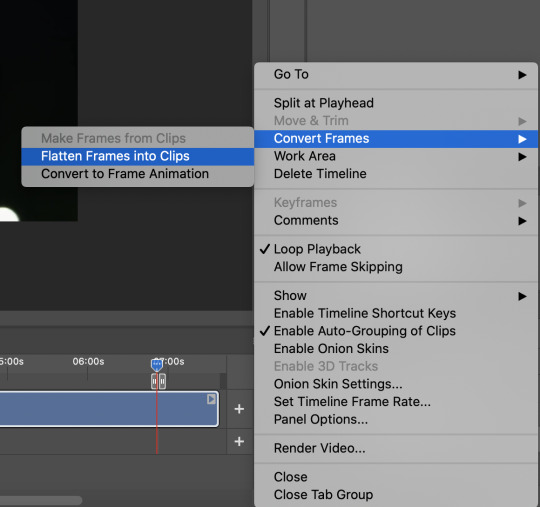
next you convert to frame animation by clicking on the symbol in the bottom left, circled in red:
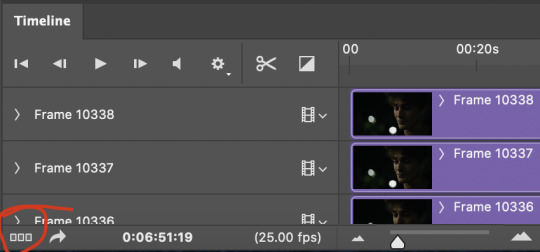
if there is more than one thing in the frame animation, delete the extra one. you don’t need to keep the last one but it won’t let you remove it until there are other frames in there. also go into your layers and delete video group 1 and its contents. don’t ask me why these steps are necessary, I don’t really know, but I’ve noticed it sometimes gets wonky if you don’t do this:
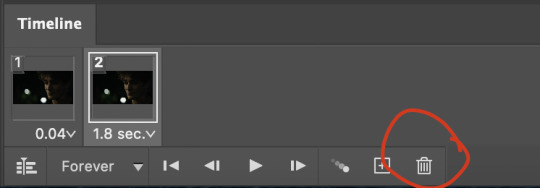

now you want to make frames from layers and delete that first frame that was there before:

then we return to the timeline:
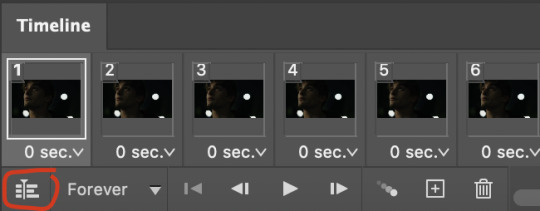
use command + option + a (control + alt + a for pc I'm pretty sure) to select all layers and then right click within your layers window and select convert to smart object. It’s important to convert to smart object after you go back to the timeline, or the gif won’t move:

next I resize. gifs for tumblr should be 540 pixels wide. for recording your action you should just go into image > image size and only change the width to 540 in case you ever have gifs cropped to different aspect ratios. don’t touch the height, let constrain proportions figure it out!

now, here’s what our base gif looks like, no sharpening, no coloring:

now to sharpen. go to filter > sharpen > smart sharpen. this is up to personal preference, but my go to settings are:

this is what we have after sharpening:

now is when you can stop recording your action.
just press the stop button in the action window:

this action is pretty much universal and after I select the moment the gif will be and crop however I want, I use it on every gif I make! so although this initial setup is tedious, now you’ll never have to do these steps again, and the process is magically much quicker.
5. it’s time to jump into coloring!
I typically start with exposure and sometimes some brightness/contrast. with really dark gifs like this, you kind of have to make it worse before you make it better. I did this:


now the gif looks like this:
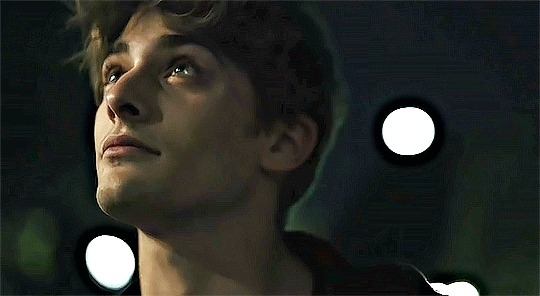
we have some static and some ugly bits, and this is where selective color comes in to fix it! boost blacks like this:
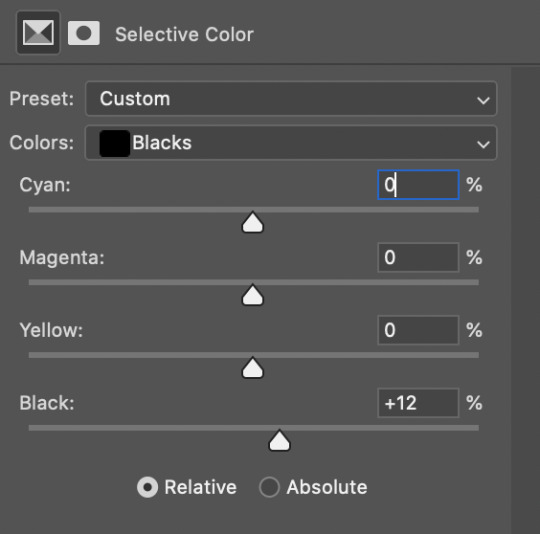
and now your gif looks like this:

the skin tone is looking a little sickly and weird, so I go into the yellows and reds in my selective color layer to fix it! I also messed with the greens here because I didn't want color in the background (that part is totally optional and just up to your preference):

now we have this:

to really take the color 100% out of the background, I did one more separate selective color layer for cyan (again, I just felt like it but this is optional!):

and now the finished gif:

there’s lots of fun extra things you can add like text and tints and overlays and all that I won’t get into, but feel free to reach out for help on those types of things!
this gif was certainly not the most complicated to color. some ridonkulously dark clips (*cough cough* vendredi 20h27 *cough cough*) take tons and tons more effort than this and a lot of the time you’ll want to use color balance layers and vibrance layers and all of that to mess with your coloring.
with all of this coloring business, I really just learned by doing. I don’t know all the technical purposes of each type of adjustment layer, and I tend to stay away from curves just because I find them confusing and annoying. The bottom line is that you should always experiment and find out whatever coloring works for you and run with it! I’m sure every gif maker you talk to does things at least a little differently!
I highly recommend taking the time to go through all the types of adjustment layers and just move the sliders around to see what they do! That’s honestly one of the best ways to learn and decide what you like!
6. now to export and adjust the delay!
the keyboard shortcut for exporting on mac is command + option + shift + s, control + alt + shift + s for pc, otherwise you can go to file > export > save for web
my settings are here:
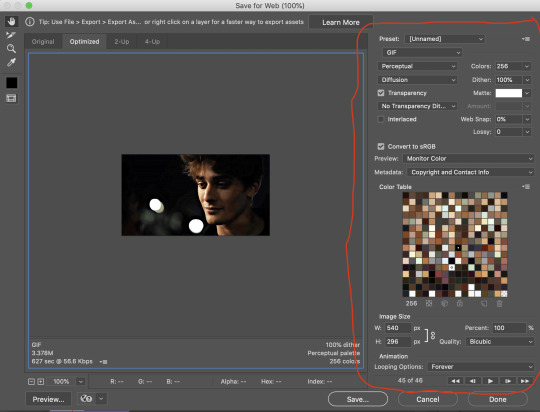
the settings only need to be configured once! otherwise just hit save and follow the pop ups to choose where to save and what name you want to give your gif. Since you saved as a psd way back, that will be the name it’s automatically given, but call it whatever you want!
then I adjust my delay by opening the gif I just exported (not the psd, the .gif file) and using one of my delay actions. I’ve made an action for each delay between 0.05 (real time) and 0.08 (really slow mo for certain super short shots, typically for more ~artsy~ sets).
all my action does is select all frames:
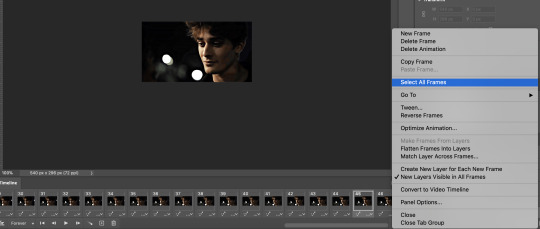
adjust the delay (which will differ based on whether you want them slowed down and by how much):

for reference, this is a 0.05 delay:

and this is a 0.08 delay

now you just export the same way you did before!
remember if you’re recording this as an action, you don’t want to touch the file name, just say yes when it asks if you want to replace the file. if you always save your gifs to the same place, your action will now enable you to override any gif with the incorrect delay with the correct one with one click!
7. tldr: the main tips
for downloading 4k video downloader works well for non geoblocked youtube videos, the all of skam website is another place you can look to download with no subs, here’s the screen capping method if you don’t want to download
The main way I combat dark lighting is to bump exposure to the right, gamma correction to the left, and then enhance black in a selective color layer. The amount of these three adjustments will vary gif to gif. I know lots of people use curves, but I find them really confusing for some reason, so this is my method! As my graphics teacher likes to say: there are always at least 3 different ways to reach the same result!
there’s a little bit of additional coloring on this one, but here’s another before and after example so you can get an idea of how those steps get you a better lit result without making the lighter parts super over exposed:

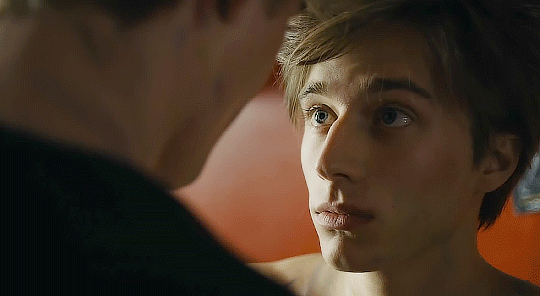
besides those three steps, you have free rein to use the other selective color channels, as well as color balance, vibrance, hue/saturation, etc. to restore color that was lost or to change the colors altogether! mess around with it and have fun experimenting!
7a. bonus coloring tip:
sometimes you can make use of selective color to completely alter an isolated color in your gif. You can get very adventurous with this, but here's a simple example of changing blue tones to teal (I got away with these gifs being longer because they were in rows of two in the set I posted them in. I'm too lazy to trim frames so I can put them here at 540 px without going over the 10mb limit so just ignore the quality ok):

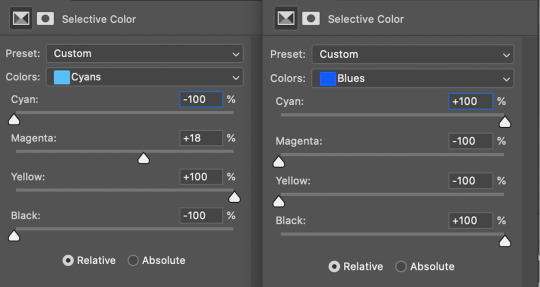

7b. actions, actions, actions!
if you find yourself doing a certain thing over and over, always record it as an action. the amount of time they will save you is honestly really impressive.
You can duplicate actions, so, for example, if you have different sharpening preferences for different shows or scenes, you can duplicate your gif process action and go into the steps, double click smart sharpen, and alter it however you want!

This could also be good to do for the different widths for tumblr if you ever do sets with rows of two or three! Duplicate actions is also how I made my actions that set delay at 0.05, 0.06, 0.07, and 0.08!
when in doubt, always make an action! it’s worth minimizing the tedious bits of the process as much as possible so you can focus on the fun part of seeing your awesome gifs come to life! any little task you find yourself doing often, make an action!
and for now that’s all I have. if any of this made no sense, if you want to suggest a correction or addition I could make, if you’re ever curious how I did something on any gifs I post, or if you have any other sort of questions, feel free to send me an ask or a dm! if I can’t answer your questions I’ll be happy to try to direct you to someone who can or a tutorial to help! again, I'm no expert, not even close, but I hope at least one person will find one thing in this mess that helps.
#this got . so long omg#mystuff#mytutorial#gif tutorial#tutorial#resources#fellow gif making peeps feel free to correct me or give input on how to improve or add to this tutorial!
31 notes
·
View notes
Text
Watching The Clone Wars, part 4
I’m back! A little later than I expected, but again, the post-holiday doldrums has essentially ended at this point and I’m back to being busy. This viewing party coveres the first season episodes “The Gungan General”, “Jedi Crash”, “Defenders of Peace”, “Trespass”, “Blue Shadow Virus”, and “Mystery of a Thousand Moons”. My thanks to @spiraling, @jaycrowind and @hiruma-musouka for watching this misbegotten show with me: I truly would not be able to do it without y’all’s company and support.
“The Gungan General” (1x12)
This is a silly continuation of the very silly episode viewed previously, but marred by the fact that Jar Jar Binks is a main character. I honestly hope to god his presence peters down after this season, because I am just gritting my teeth at every episode that features him. On the plus side, it does have clones from the Coruscant Guard (at least, I assume some from the armor paint), and seeing them choose to weaponize Jar-Jar’s presence was a rare delight.
Other things to enjoy in this episode: Hondo. He so over-the-top and ridiculous, but his character actually makes sense for once, which is another too-rare pleasure in this show. He’s venal and greedy, and so are his men, but his motivations are clear, as are his methods. Also, I just love smugglers in general, and PT-era Star Wars is tragically underpopulated by such characters.
Finally, at this point I’m beginning to notice that the Jedi and Sith Force powers are very uneven in their application. As far as I can see, they only work as well (or badly) as necessary for the plot, which I guess is fine. The Force is basically a soft magic system, which is befitting since this is space fantasy.
“Jedi Crash” (1x13)
#give aayla armor
I’m gonna pretend she was actually wearing something like that the whole time. Like, I’m joking but not really. Why doesn’t Aayla have armor like Obi-Wan? And don’t tell me it’s because that’s what’s she wearing in RotS, Obi-Wan sure as hell ain’t wearing his RotS gear in this season...
Ugh, I just have so many opinions about how female characters are written and presented on this show in particular, and the PT in general, but I’m gonna save it for a more coherent post in the future.
Back to the episode proper: this ship-to-ship combat actually makes sense on a tactical level - I just love the droids/drones boarding the ship by force - but why are they in atmosphere? I know that atmo-combat looks cool, but it makes absolutely no sense given what Star Destroyers are built for. Yes, I’m aware that whining about this is petty, but I’m going to keep complaining about it until I feel better.
I feel like Anakin is unselfish expressly for the purpose of setting up a lesson for Ahsoka. It’s not bad, but it’s not great. I’m very meh on Anakin in general, though, so perhaps other people might see it differently.
Finally, the lemur colonists’ story makes no sense, timeline-wise. The war has only being going on for less than a year! Did they colonize the planet before the war broke out, or after? Is their home planet an active participant in either side? Are they already self-sufficient, or are they still receiving support from the next wave of colonists back home? As you can see, I am deeply invested in the economics and logistics of this situation.
“Defenders of Peace” (1x14)
God, the CIS is cartoonishly evil. It’s so evil I can’t take it seriously, and I’m a person who enjoyed the OT and thinks Tarkin was actually the best villain. I also found the inevitable denouement of the lemur people plot really annoying. I’m not fond of pacifistic storylines, but they can be done well if the writers want to give a fair shake to the ideology. TCW’s writers don’t, therefor the lemurs are just another strawman group who only exist to show how good the heroes are.
“Trespass” (1x15)
I love how we see graphic clone death in the first 30 seconds of the episode. At this point, I believe either Cartoon Network or Lucasfilm paid off the MPA, because there is no way this was rated PG legitimately.
Although I love Riyo Chuchi’s overall character design, I am offended by her youth. Why are there so many “young lady politicians” in Star Wars? Did everyone just look at Padme and say “yeah, this makes sense and is not absolutely stupid, let’s have more of the same?”
Anyway, I like to think Riyo is actually a soft-spoken, non-assertive middle-aged woman who is consistently underestimated in the Senate due to the fact the wealthy humans of the Core Worlds don’t know enough about her species to accurately gauge her age.
The actually plot of this story is executed reasonably well, although I honestly have no idea why two generals/battalions are necessary for this excursion. Also, am I the only one who found the Pantoran assertion that the yeti aliens are a complete discovery a bit silly? You guys have space flight, and presumably satellites, but you don’t know a primitive society is living on the planet you orbit? Really? Seems like a stretch.
“Blue Shadow Virus” (1x16)
Jar Jar’s actions in the initial interrogation that begin this episode can only be explained in the context of him being a secret Sith apprentice. Anyway, another cartoonishly evil villain from the CIS side. They’ve graduated from targeting hospitals to playing with bioweapons!

Anyway, the whole episode is yet another example of poor military strategy. You know what the Naboo Queen should have done? Nuked that black site from orbit, for the safety of her people and the galaxy at large.
“Mystery of a Thousand Moons” (1x17)
I just found this all very tedious. Obi-Wan and Anakin banter can lift an episode sometimes, but this wasn’t one of them. Anyway, the idea that one (1) root is going to produce a cure for a disease (that presumably already has a cure since it was originally eradicated decades ago) is just laughable. Finally, still noticing the timeline described in the episodes doesn’t make any sense. The idea that the CIS would invade Iego’s moons (for what reason?) and then leave (for what reason??), but leave a trap to keep everyone else from leaving (???) that then spurs the creation of an urban myth, all within the space of a year or less, is also stretching the bounds of my belief. It’s like the writers want to pretend the war has been going on for years, instead of a few months....
Next week: I complete the majority of the first season by watching the three-episode Ryloth arc, and start the second season by watching the time Cad Bane tried jumpstart the Emperor’s Hand program early.
5 notes
·
View notes
Text

How Can Good Exegesis Make Bad Theology?
By Author Eli Kittim
——-
The Canonical Context
This principle suggests that we should read the Books of the Bible not as distinct, individual compositions but rather as parts of a larger *canonical context*, that is, as part of the “canon” of Scripture. In other words, instead of evaluating each book separately in terms of its particular historical, literary, and editorial development, this principle focuses instead on its final canonical format that was legitimized by the various communities of faith. The idea is that since the redacted version or “final cut,” as it were, is considered “authoritative” by the different communities of faith, then this format should hold precedence over all previous versions or drafts.
Moreover, this concept holds that despite the fact that the Biblical Books were written by a number of different authors, at different times, in different places, using different languages, nevertheless the “canonical context” emphasizes the need to read these Books in dialogue with one another, as if they are part of a larger whole. So, the hermeneutical focus is not on the historical but rather on the canonical context. The hermeneutical guidelines of the canon therefore suggest that we might gain a better understanding of the larger message of Scripture by reading these Books as if they were interrelated with all the others, rather than as separate, diverse, and distinct sources. The premise is that the use of this type of context leads to sound Biblical theology.
——-
Theology
Theology is primarily concerned with the synthesis of the diverse voices within Scripture in order to grasp the overarching message of the complete Biblical revelation. It deals with Biblical epistemology and belief, either through systematic analysis and development of passages (systematic theology) or through the running themes of the entire Bible (Biblical theology). It addresses eternity and the transcendent, metaphysical or supernatural world. And it balances individual Scriptural interpretations by placing them within a larger theoretical framework. The premise is that there is a broader theological context in which each and every detailed exegesis coalesces to form a coherent whole! It’s as if the Bible is a single Book that contains a complete and wide-ranging revelation! It is under the auspices of theology, then, that the canonical context comes into play.
——-
Exegesis
The critical interpretation of Scriptural texts is known as “exegesis.” Its task is to use various methods of interpretation so as to arrive at a definitive explanation of Scripture! Exegesis provides the temporal, linguistic, grammatical, and syntactic context, analysis, and meaning of a text. It furnishes us with a critical understanding of the authorial intent, but only in relation to the specific and limited context of the particular text in question. It is the task of theology to further assess it in terms of its relation and compatibility to the overall Biblical revelation! One of the things that exegesis tries to establish is the composition’s historical setting or context, also known as “historical criticism.” This approach inquires about the author and his audience, the occasion and dating of the composition, the unique terms and concepts therein, the meaning of the overall message, and, last but not least, the *style* in which the message is written, otherwise known as the “genre.” While the author’s other writings on the topic are pivotal to understanding what he means, nothing is more important than the *genre* or the form in which his writing is presented.
——-
The Analogy of Scripture
One of the most important hermeneutical principles of exegesis is called “the analogy of Scripture” (Lat. ‘analogia Scripturae’). In short, it means that Scripture should interpret Scripture. This principle requires that the implicit must be explained by the explicit. In other words, the exegesis of unclear or ambiguous parts of Scripture must be explained by clear and didactic ones that address the exact same topic. That means that one Biblical Book could very well explain another. For example, the New Testament (NT) Book of Ephesians 1.9-10 seems to demystify Galatians 4.4. This principle is based on the “revealed” inspiration (Gk. θεόπνευστος) of Scripture:
All scripture is inspired by God and is useful
for teaching, for reproof, for correction, and
for training in righteousness (2 Tim. 3.16
NRSV).
As for those scholars who refuse to take the NT’s alleged “pseudepigrapha” seriously because of their *apparent* false attribution, let me remind them that the most renowned textual scholars of the 20th century, Bruce M. Metzger and Bart D. Ehrman, acknowledged that even alleged “forged” works could still be “inspired!” It’s important to realize that just because these works may be written by unknown authors who may have attempted to gain a readership by tacking on the name of famous Biblical characters doesn’t mean that the subject-matter is equally false. The addition of amanuenses (secretaries) further complicates the issue.
So, returning to our subject, the analogy of Scripture allows the Bible to define its own terms, symbols, and phrases. It is via the analogy of Scripture, which defines the many and varied parts, that the broader canonical context is established, namely, the principle that the various Biblical Books form a coherent whole from which a larger theological system can emerge.
And, of course, interdisciplinary studies——such as archaeology, anthropology, psychology, sociology, epistemology, and philosophy——contribute to both systematic and Biblical theology by presenting their particular findings, concepts, and theoretical ideas.
——-
Testing the Legitimacy of these Principles
In explaining how these principles work in tandem, I’d like to put my personal and unique theology to the test. I have raised the following question: “What if the crucifixion of Christ is a future event?” The immediate reaction of Christian apologetics or heresiology would be to revert to “dogmatic theology” (i.e., the dogmas or articles of faith) and the scholarly consensus, which state that Jesus of Nazareth was crucified under Pontius Pilate during the reign of Tiberius. Really? Let’s consider some historical facts. There are no eyewitnesses! And there are no first-hand accounts! Although the following references were once thought to be multiple attestations or proofs of Jesus’ existence, nevertheless both the Tacitus and Josephus accounts are now considered to be either complete or partial forgeries, and therefore do not shed any light on Jesus’ historicity. One of the staunch proponents of the historical Jesus position is the textual scholar Bart Ehrman, who, surprisingly, said this on his blog:
. . . Paul says almost *NOTHING* about the
events of Jesus’ lifetime. That seems weird
to people, but just read all of his letters.,
Paul never mentions Jesus healing anyone,
casting out a demon, doing any other
miracle, arguing with Pharisees or other
leaders, teaching the multitudes, even
speaking a parable, being baptized, being
transfigured, going to Jerusalem, being
arrested, put on trial, found guilty of
blasphemy, appearing before Pontius Pilate
on charges of calling himself the King of the
Jews, being flogged, etc. etc. etc. It’s a
very, very long list of what he doesn’t tell us
about.
Therefore, there appears to be a literary discrepancy regarding the historicity of Jesus in the canonical context between the gospels and the epistles. And, as I will show in due time, there are many, many passages in the epistles that seem to contradict dogmatic theology’s belief in the historiographical nature of the gospels. So, if they want to have a sound theology, exegetes should give equal attention to the epistles. Why?
First, the epistles precede the gospels by several decades. In fact, they comprise the earliest recorded writings of the NT that circulated among the Christian churches (cf. Col. 4.16).
Second, unlike the gospels——which are essentially *theological* narratives that are largely borrowed from the Old Testament (OT)——the epistles are *expositional* writings that offer real, didactic and practical solutions and discuss spiritual principles and applications within an actual, historical, or eschatological context.
Third, according to Biblical scholarship, the gospels are not historiographical accounts or biographies, even though historical places and figures are sometimes mentioned. That is to say, the gospels are not giving us history proper. For example, the feeding of the 5,000 is a narrative that is borrowed from 2 Kings 4.40-44. The parallels and verbal agreements are virtually identical. And this is a typical example of the rest of the narratives. For instance, when Jesus speaks of the damned and says that “their worm never dies, and the fire is never quenched” (Mark 9.48), few people know that this saying is actually derived from Isaiah 66.24. In other words, the gospels demonstrate a literary dependence on the OT that is called, “intertextuality.”
Fourth, the gospels are like watching a Broadway play. They are full of plots, subplots, theatrical devices (e.g. Aristotelian rhetoric; Homeric parallels), literary embellishments, dialogues, characters, and the like. Conversely, the epistles have none of these elements. They are straightforward and matter of fact. That’s why Biblical interpreters are expected to interpret the implicit by the explicit and the narrative by the didactic. In practical terms, the NT epistles——which are the more explicit and didactic portions of Scripture——must clarify the implicit meaning of the gospel literature. As you will see, the epistles are the primary keys to unlocking the actual timeline of Christ’s *one-and-only* visitation!
Fifth, whereas the gospels’ literary genre is mainly •theological•——that is to say, “pseudo-historical”——the genre of the epistolary literature of the NT is chiefly •expositional.• So, the question arises, which of the two genres is giving us the real deal: is it the “theological narrative” or the “expository writing”?
In order to answer this question, we first need to consider some of the differences in both genres. For example, although equally “inspired,” the gospels include certain narratives that are unanimously rejected as “unhistorical” by both Biblical scholars and historians alike. Stories like the slaughter of the innocents, the Magi, the Star of Bethlehem, and so on, are not considered to be historical. By contrast, the epistles never once mention the aforesaid stories, nor is there any mention of the Nativity, the virgin birth, the flight to Egypt, and the like. Why? Because the Epistles are NOT “theological.” They’re expository writings whose intention is to give us the “facts” as they really are!
Bottom line, the epistles give us a far more accurate picture of Jesus’ *visitation* than the gospels.
In conclusion, it appears that the gospels conceal Jesus far more effectively than they reveal him.
——-
Proof-text and Coherence Fallacies
The “proof-text fallacy” comprises the idea of putting together a number of out-of-context passages in order to validate a particular theological point that’s often disparagingly called “a private interpretation.” But, for argument’s sake, let’s turn these principles on their head. Classical Christianity typically determines heresy by assessing the latter’s overall view. If it doesn’t fit within the existing theological schema it is said to be heretical. Thus, dogmatic theology sets the theological standard against which all other theories are measured. They would argue that good exegesis doesn’t necessarily guarantee good theology, and can lead to a “coherence fallacy.” In other words, even if the exegesis of a string of proof-texts is accurate, the conclusion may not be compatible with the overall existing theology. This would be equivalent to a coherence fallacy, that is to say, the illusion of Biblical coherence.
By the same token, I can argue that traditional, historical-Jesus exegesis of certain proof-texts might be accurate but it may not fit the theology of an eschatological Christ, as we find in the epistles (e.g., Heb. 9.26b; 1 Pet. 1.20; Rev. 12.5). That would equally constitute a coherence fallacy. So, these guidelines tend to discourage independent proof-texting apart from a systematic coherency of Scripture. But what if the supposed canonical context is wrong? What if the underlying theological assumption is off? What then? So, the $64,000 question is, who can accurately determine the big picture? And who gets to decide?
For example, I think that we have confused Biblical literature with history, and turned prophecy into biography. In my view, the theological purpose of the gospels is to provide a fitting introduction to the messianic story *beforehand* so that it can be passed down from generation to generation until the time of its fulfillment. It is as though NT history is *written in advance* (cf. מַגִּ֤יד מֵֽרֵאשִׁית֙ אַחֲרִ֔ית [declaring the end from the beginning], Isa. 46.9-10; προεπηγγείλατο [promised beforehand], Rom. 1.2; προγνώσει [foreknowledge], Acts 2.22-23; προκεχειροτονημένοις [to appoint beforehand], Acts 10.40-41; ερχόμενα [things to come], Jn 16.13)!
So, if we exchange the theology of the gospels for that of the epistles we’ll find a completely different theology altogether, one in which the coherence of Scripture revolves around the *end-times*! For example, in 2 Pet. 1.16–21, all the explanations in vv. 16-18 are referring to the future. That’s why verse 19 concludes: “So we have the prophetic message more fully confirmed” (cf. 1 Pet. 1.10-11; 1 Jn 2.28).
In response, Dogmatic Theology would probably say that such a conclusion is at odds with the canonical context and that it seems to be based on autonomous proof-texting that is obviously out of touch with the broader theological teaching of Scripture. Really? So the so-called “teaching” of Scripture that Jesus died in Antiquity is a nonnegotiable, foregone conclusion? What if the basis upon which this gospel teaching rests is itself a proof-text fallacy that is out of touch with the teaching of the *epistles*? For example, there are numerous passages in the epistles that place the timeline of Jesus’ life (i.e., his birth, death, and resurrection) in *eschatological* categories (e.g., 2 Thess. 2.1-3; Heb. 1.1-2; 9.26b; 1 Pet. 1.10-11, 20; Rev. 12.5; 19.10d; 22.7). The epistolary authors deviate from the gospel writers in their understanding of the overall importance of •eschatology• in the chronology of Jesus. For them, Scripture comprises revelations and “prophetic writings” (see Rom. 16.25-26; 2 Pet. 1.19-21; Rev. 22.18-19). Therefore, according to the *epistolary literature*, Jesus is not a historical but rather an “eschatological” figure! Given that the NT epistles are part of the Biblical *canon,* their overall message holds equal value with that of the NT gospels, since they, too, are an integral part of the canonical context! To that extent, even the gospels concede that the Son of Man has not yet been revealed (see Lk. 17.30; cf. 1 Cor. 1.7; 1 Pet. 1.7)!
What is more, if the canonical context demands that we coalesce the different Biblical texts as if we’re reading a single Book, then the overall “prophetic” message of Revelation must certainly play an important role therein. The Book of Revelation places not only the timeline (12.5) but also the testimony to Jesus (19.10b) in “prophetic” categories:
I warn everyone who hears the words of the
prophecy of this book: if anyone adds to
them, God will add to that person the
plagues described in this book; if anyone
takes away from the words of the book of
this prophecy, God will take away that
person’s share in the tree of life and in the
holy city, which are described in this book
(Rev. 22.18-19 NRSV).
Incidentally, the Book of Revelation is considered to be an epistle. Thus, it represents, confirms, and validates the overarching *prophetic theme* or eschatological “theology” of the epistolary literature. That is not to say that the •theology• of the epistles stands alone and apart from that of the OT canon. Far from it! Even the *theology* of the OT confirms the earthy, end-time Messiah of the epistles (cf. Job 19.25; Isa. 2.19; Dan. 12.1-2; Zeph. 1.7-9, 15-18; Zech. 12.9-10)! As a matter of fact, mine is the *only* view that appropriately combines the end-time messianic expectations of the Jews with Christian Scripture!
Does this sound like a proof-text or coherence fallacy? If it does, it’s because you’re evaluating it from the theology of the gospels. If, on the other hand, you assess it using the theology of the epistles, it will seem to be in-context or in-sync with it. So, the theological focus and coherency of Scripture will change depending on which angle you view it from.
——-
Visions of the Resurrection
There are quite a few scholars that view the so-called resurrection of Christ not as a historical phenomenon but rather as a visionary experience. And this seems to be the theological message of the NT as well (cf. 2 Tim. 2.17-18; 2 Thess. 2.1-3). For example, Lk. 24.23 explicitly states that the women “had indeed seen a vision.” Lk. 24.31 reads: “he [Jesus] vanished from their sight.” And Lk. 24.37 admits they “thought that they were seeing a ghost.” Here are some of the statements that scholars have made about the resurrection, which do not necessarily disqualify them as believers:
The resurrection itself is not an event of
past history. All that historical criticism can
establish is that the first disciples came to
believe the resurrection (Rudolph
Bultmann, ‘The New Testament and
Mythology,’ in Kerygma and Myth: A
Theological Debate, ed. Hans Werner
Bartsch, trans. Reginald H. Fuller [London:
S.P.C.K, 1953-62], 38, 42).
When the evangelists spoke about the
resurrection of Jesus, they told stories
about apparitions or visions (John Dominic
Crossan, ‘A Long Way from Tipperary: A
Memoir’ [San Francisco:
HarperSanFransisco, 2000], 164-165).
At the heart of the Christian religion lies a
vision described in Greek by Paul as
ophehe—-“he was seen.” And Paul himself,
who claims to have witnessed an
appearance asserted repeatedly “I have
seen the Lord.” So Paul is the main source
of the thesis that a vision is the origin of the
belief in resurrection ... (Gerd Lüdemann,
‘The Resurrection of Jesus: History,
Experience, Theology.’ Translated by John
Bowden. [London: SCM, 1994], 97,
100).
It is undisputable that some of the followers
of Jesus came to think that he had been
raised from the dead, and that something
had to have happened to make them think
so. Our earliest records are consistent on
this point, and I think they provide us with
the historically reliable information in one
key aspect: the disciples’ belief in the
resurrection was based on visionary
experiences. I should stress it was visions,
and nothing else, that led to the first
disciples to believe in the resurrection (Bart
D. Ehrman, ‘How Jesus Became God: The
Exaltation of a Jewish Preacher from
Galilee’ [New York: Harper One, 2014],
183-184).
Ehrman sides with the *visionary language* that Luke, Bultmann, Crossan, and Lüdemann use. In the words of NT textual critic Kurt Aland:
It almost then appears as if Jesus were a
mere PHANTOM . . .
——-
Exegetical Application
I deliberately stay away from theology when I exegete Scripture precisely because it will taint the evidence with presuppositions, assumptions, and speculations that are not in the text. Thus, instead of focusing on the authorial intent hermeneutic, it will inevitably superimpose out-of-context meanings and create an eisegesis. All this, of course, is courtesy of confirmation bias.
So, I think one of the reasons why we’ve done so poorly in understanding, for example, the story of Jesus is because we have mixed-up exegesis with theology. When theology drives the exegesis, then the exegesis becomes blind and erroneous.
My method of exegesis is very simple. I see EXACTLY what the text *says,* EXACTLY *how* it says it. I don’t add or subtract anything, and I don’t speculate, guess, or theorize based on existing philosophies or theologies. The minute we go outside *the analogy of scripture,* that’s when we start to speculate. And that’s how we err. In short, let the Scriptures tell you what it means. Thus, the best interpretation is no interpretation at all!
——-
Conclusion
To find the truth, we must consider all the evidence objectively. Evangelicals, for instance, would be biased if they didn’t consider the academic standpoint even if, at times, it seems to be guided by liberal theology. In this way, they will be in a better position to consider objectively all the possibilities and probabilities regarding the correct interpretation of Scripture. That’s because the truth usually touches all points of view . . .
One of the exegetical stumbling blocks is our inability to view the gospels as “inspired metaphors.” Given their literary dependence on the OT, it appears as if the gospels themselves are “inspired parables.”
So, if the epistolary literature, which is both expositional and explicit, seems to contradict these so-called “theological parables,” then it becomes quite obvious that the “theology” of the gospels fails to meet scholarly and academic parameters. And, therefore, the epistolary literature must be given more serious attention and consideration!
Our exegetical shortcomings often stem from forced or anachronistic interpretations that are based on *theological speculation* and conjecture rather than on detailed exegesis. Even the Biblical translations themselves are not immune to the interpretative process, whether they be of dynamic or formal equivalence.
That’s why I have developed an exegetical system and have demonstrated the effectiveness of its approach to the study of the Biblical Christ. Accordingly, I argue that the epistles are the primary *keys* to unlocking the future timeline of Christ’s ***ONLY*** visitation! Hence, I leave you with one final rhetorical question:
What if the crucifixion of Christ is a future
event?
#canonical context#biblical theology#systematic theology#exegesis#authorial intent#biblical criticism#biblical interpretation#bible prophecy#eli kittim#the little book of revelation#future eschatology#end times#historical criticism#the analogy of scripture#pseudepigrapha#Bruce Metzger#bart ehrman#christian apologetics#heresiology#dogmatic theology#Tacitus#Josephus#canonical gospels#epistles#proof-text fallacy#coherence fallacy#Rudolf Bultmann#John Dominic Crossan#Gerd Lüdemann#Kurt Aland
7 notes
·
View notes
Note
Why do you like cinnabar so much? I personally can't really stand them but I'm still happy they're finally content with life! Cinnabar is my Cinnababy, no matter how cruel they are to my other and more baby, phos.

this is very hard for me to explain in a logical way.
most people will think it’s a given, but ive read and heard enough polarized opinions to avoid taking my chances so, before we start, here’s a disclaimer: im perfectly aware that cinnabar’s character has flaws, that their canon relationship with phos isnt healthy, that they made mistakes and will probably keep on making mistakes (and ive written a number of posts about it).
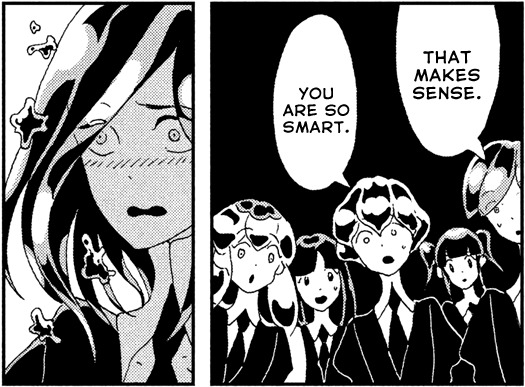
now that we’ve got this over with, i’ll tell you that i dont really know why i like cinnabar so much. sometimes a character just vibes with you (look at me, using cool kids vocabulary) and bam, theyre a fave.
as a start, since chapter 2 and episode 1, i liked the way they were introduced in the story: the character’s design, their theme (shinsha’s theme is one of the best songs in the ost, come on), their personality. the way they kept phos and everyone else away but still cared about them was so bittersweet. it made me want to hug them but it also got me thinking about gem society: why is cinnabar so isolated? why no one cares? how did it get to this?
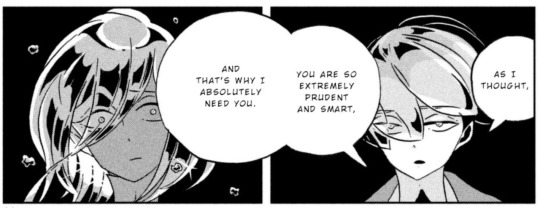
they’re so similar to phos, too, and the more i grew to like phos the more i grew to like cinnabar and their interactions. they had this unique chemistry that other gems in the show didnt have, it was more nuanced and complex than the other relationships we could see in the series and that too got me thinking about gem society.
they were both outcasts after all, it was very clear that they were trying to battle loneliness and find a sense of purpose in different ways and that was interesting (and sad ofc, but hey this is hnk).
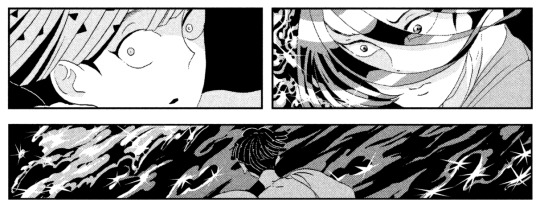
but cinnabar is an independent character from phos and i love how ichikawa kept highlighting that as she showed their relationship deteriorate with time. in the end, cinnabar makes their own choices and by doing so they show character growth.
it took me a while to appreciate cinnabar as much as i do now and their newfound independence played a big part. they became their own character and in doing so they became much more interesting. theyre moving, growing, changing, making mistakes, thinking about things in a world where no one ever thinks about anything and those who do are either outcasts or betrayers or both.

i also suppose i see myself in cinnabar more than in any other character, and it’s very rare for me to find a character and go ‘oh woah, theyre just like me’ so that was a plus. sometimes i just want to shake some sense into their head cause im like ‘ive been through this, i know why youre doing this and it’s not healthy, you dumb rock. just speak out’
i like cinnabar’s personality: they’re smart, they’re brilliant, theyre anxious and shy, they’re avoidant, selfless, rude, self loathing, secretive but at the same time so easy to read, they give great advice and look complicated but they really just wanted one thing, to be loved, and this speaks so much about the problems gem society has.
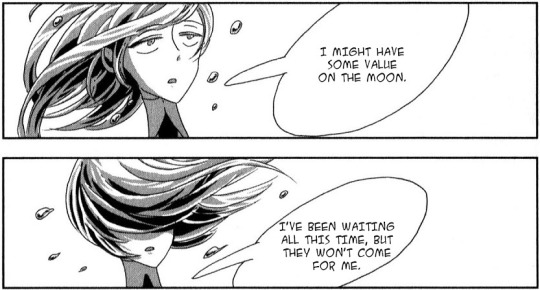
cinnabar’s character is also testament to the fact that you have to create your future with your own hands, you cannot project your hopes on someone else, wait for a saviour, cry about your failures and misfortunes and hope everything goes well. you have to act.
now, phos is a much better example of this, of course, but i appreciate cinnabar’s attempt at this, even if i dont condone their methods: communication is essential and cinnabar cannot communicate sincerely for the life of them.

i also like to speculate about cinnabar’s past, all the small moments we didnt see on screen and that led them to take on night patrolling: were they friends with antarc? with other gems? with gems that were abducted? i like to empathize with shinsha, get in their shoes and try to understand why they acted a certain way, why they said a certain thing, because 90% of cinnabar’s decisions happen offscreen, 90% of their processing happens in their head and writing character metas is one of my favorite things to do, as you all probably have noticed.
complex thought process, lots of things left unsaid, flaws, mistakes, an attempt to change, cool personality… idk, i just like them. please shinsha stans come to my aid cause im sure i forgot something but its so hard to make this post into something coherent
#houseki no kuni#land of the lustrous#hnk#cinnabar#shinsha#anonymous#i just luv them so much idk what to tell you#i see a shinsha and my eyes are blinded#that smile? carved in my memory#its never going away
143 notes
·
View notes
Text
The Shoulder
Fandom: Sanders Sides
Warnings: mentioned violence
Pairings: platonic DLAMP
Words: 2,795
Summary: Virgil gets hurt and the last thing he wants to do is be vulnerable withe people. Unfortunately for him, there are a few people he might like to be able to be vulnerable with.
Any inaccuracies with this one are on me, as I have never dislocated a shoulder. My sincerest apologies to every character I wrong when I get bored. Sorry, I had no idea what to name this.
Virgil didn’t want to knock on the door. He wanted to turn around and run away, tail tucked between his legs, and face the wrath of his friends sometime next week, when he couldn’t feasibly put off seeing them any longer. Truth be told, he wouldn’t have even come here if it had just been a few cuts and bruises.
But it wasn’t.
No, Virgil’s entire arm was kind of useless at the moment. Mostly because his shoulder got dislocated. While Virgil would love to say he could deal with that wound on his own, he knew better. He also knew that if he didn’t come for help and his friends found out, they might actually kill him. So, here he was. Trying to knock. It was harder than it looked, okay?
Finally, Virgil rapped the bruised knuckles on his functional hand against the door, trying not to wince. He only had to wait a few seconds before he heard pounding feet coming right at the door. Then it flew open to reveal Patton’s excited face.
“Hey, Virge! We weren’t sure if you were going to come tonight or-” Patton’s speech ground to halt as he finally took Virgil in. His hand reached out and gently cupped the less bruised side of his face. “Oh, Virgil.”
“Could I come in?” he grunted. Patton nodded and withdrew, leaving the entryway wide open before Virgil. He stumbled inside, and when Patton tried to wrap an arm around his waist to support him Virgil jolted. There were just too many bruises on his body for anything to not hurt.
Patton helped Virgil into the kitchen and he (carefully) collapsed in a chair. Patton rushed off before Virgil could even say thanks, and then he came back with the first aid kit and Logan in tow.
“Who did this to you?” Patton asked as he began setting up the supplies he needed. Virgil glanced away, and then made an aborted shrug-stupid fucking shoulder.
“Same old, same old.” He tried not to notice the assessing gaze that Logan directed at him, the sharp eyes that would see the reason Virgil had come here likely before Virgil felt like addressing it.
“Virgil, that’s not a name.” Patton began wiping Virgil’s face with something wet, a little harsher than he needed to. Virgil hissed and jerked back.
“Jesus, Pat. Are you trying to reopen the cuts?”
“Stop complaining,” Patton shot back and continued cleaning up the blood with barely any change to his methods. “You know, if you could just call us before doing something so-so-”
“Obtuse? Ludicrous? Half-witted? Shortsighted?” Logan suggested.
“Stupid, then you wouldn’t be nearly as hurt half as often. We could help you. You know we would.” Patton hesitated, eyes softening for a second. “We take care of our own, Virge.”
Before Virgil could refute that, say that they shouldn’t have to, or explain that it actually wasn’t his fault this time, he heard two more pairs of feet stomping down the steps.
“Padre! Nerd! What’s taking so long-” Roman stopped dead as he entered the kitchen, causing Dee to walk face first into his back. Roman barely budged, eyes glued to what he could see of Virgil’s injuries. His voice was an unbearably soft, concerned whisper as he said, “What the hell, Virgil?” and then turned angry and much louder as he proceeded it with, “Another fight? Are you fucking serious?”
Once again, no one waited for Virgil’s response or defense. Logan told Roman to calm down, and Roman began yelling at them both, and Logan got in Roman’s face. Then Patton abandoned his station as caretaker to get between the two of them and prevent the second fight that Virgil could lay witness to that night.
It was only Dee, who edged around the brewing tensions, that acknowledged Virgil in the situation at all.
“Damn,” he muttered, taking in Virgil’s face and pinching his chin to move it around to see from all angles, “I’d hate to see the other guy.”
“Guys.”
“What.” Dee’s voice lost all emotion and he brought Virgil’s face back to stare directly into his eyes. “What the fuck did you just say?”
“Guys. Plural. As in more than one,” Virgil spat. He was glaring, but they both knew it had nothing to do with Dee.
At least, Virgil thought they both knew that.
Dee dropped Virgil’s face and stalked across the kitchen like a storm, finally gathering the attention of the other three. His face was curled into a snarl, scar standing out stark white against the burning red. He stood at the sink for a moment, staring out the window. Logan reached forward.
“Dee, is everything-”
He spun, startling Logan into going quiet. “Are you telling me,” he said - at Virgil more than to him, but at least he was speaking with Virgil in mind, right? “Are you telling me that you went out and fought multiple people at the same time without getting us first?” Dee’s voice had gone from barely controlled anger to outright yelling, and as soon as he finished the others were all piling on, adding their two cents to something they knew nothing about.
Virgil launched himself out of the chair then, and went for the back door. Gods, he wouldn’t have come at all if he had known that they would react like this, if he had realized they were just going to yell and scream and set off his anxiety after he’d already had his ass beat once tonight. This was bullshit. And really, wasn’t it what Virgil got? The one time he actually tries to get help, accept the offer that they will always be there for him, of course they would only get mad and blame Virgil for it, as though Virgil wanted to be covered in bruises and blood and injuries and-
Virgil felt the hand wrap around his dislocated arm, and Virgil tried to backpedal before his arm got yanked by his own stupid momentum, but -
But it was too late.
Virgil screamed as his arm wrenched backward and he hit the floor, curling in on himself. He could only be vaguely aware of the hand on his arm disappearing because the pain exploding from his shoulder was taking up all his senses. It pounded through him like a hammer and anvil, and all he could do was press his face into his knees and force breaths through clenched teeth in the same pattern Logan had taught him so long ago. It helped with panic, so maybe it would help with pain, too.
Minutes later, or hours or days, Virgil could hear Logan’s voice in front of him. “Just keep breathing Virgil. You’re doing very well. Keeping breathing.” He could also hear Logan’s hand making a steady beat against the linoleum of Patton’s kitchen, and he began the nerve-wracking process of matching his breathing to that pattern. Logan was a much steadier counter than Virgil was. It made for a much more effective breathing exercise.
It took at least ten more minutes for Virgil to be able to think coherent thoughts past the pain, and another two to even consider talking when every part of him hurt so badly.
“I’m-I’m good now,” he panted to Logan. He slowly uncurled himself from his knees. “Help me up?”
“Where-where will it not hurt?” Logan asked, and Virgil snorted. (Which hurt and almost threw Virgil headlong into a round of crying, but he had some self control, give him credit.)
“Everything hurts, L. Just, just take my hand, yeah?” Virgil offered Logan his more functional arm, and after a moment’s hesitation Logan used the arm to pull Virgil up. When he was standing again, Virgil pressed his head against Logan’s shoulder with his eyes closed and chanted I will not puke in his head until the vertigo passed.
“Virgil? What’s wrong?” That was definitely Patton’s voice, shaky and soft. Virgil glanced at him to see Patton was standing farther away than the other two, and he was holding his hands to his chest like he’d been burned.
Patton had been the one to grab his arm, then.
“I-it’s, um, can I-sit. I need to sit down.” Logan helped Virgil to the table, barely touching him like he thought one wrong move would kill him. Virgil wanted to laugh, but that wouldn’t be appropriate right now, and it would probably kick start another argument and Virgil would definitely have to leave if that happened.
“Is your arm broken?” Dee asked, and he tried for his regular look of nonchalance, but he was pale and holding Roman’s hand. Virgil opened his mouth to speak, but another bout of nausea almost had him redecorating Patton’s kitchen, so he clamped his hand over his mouth and tried not to let the bile come up.
“Who did this, Virge?” Patton asked. “How did this happen?”
Virgil took a deep breath in, and tried to focus on the others’ breathing. It was better than pain and more real than the chair he was sitting on.
“I was coming here, and I crossed the alley by the river,” Virgil said.
“Stupid,” Roman whispered. It was less an accusation than a plea. Virgil whole-heartedly agreed. Stupid didn’t even kind of cover it, and he wished he could stop.
“Yeah, well, I thought-I don’t know. It doesn’t matter. Point is, Remus’s friends were hanging down there, and I didn’t realize that until I was getting the shit kicked out of me.” Virgil did laugh then, small and cold and painful. It was too funny, really. He was always warning the others not to take that path, not to go where they knew those assholes hung out alone, and yet Virgil decided to do it. Alone. At night. All because he’d been running a little late and had missed more than his share of their hang-outs. It wasn’t fair, and Virgil was tired of not seeing his friends. Virgil was tired of showing up with bruises. Virgil was just very, very tired.
“I am going to kick hisss asssss,” Dee muttered, slipping into the hiss that only his closest friends got to hear. The look on Logan and Roman’s faces seemed to say that they agreed, which was odd considering Logan was the one most opposed to violence in their group.
Virgil decided not to dwell on that.
“So, what’s wrong with your arm?” Patton murmured.
“Shoulder’s dislocated, I think. I felt something pop and it hurts like a bitch.”
“God, I am so sorry, Virgil. I didn’t even-”
“It’s fine, Pat. It’s not your fault.” Virgil kept his eyes firmly on his hands in his lap. “I didn’t exactly tell you.”
“No, V, it’s-”
“Not now, Patton. We need to handle this injury before anything else.” Logan was eyeing Virgil’s shirt and jacket like a particularly difficult puzzle. “I need to see your shoulder to fix this, and to do that I will need to remove your clothes. I can infer that such an action would cause you immense pain, so I am unsure as to how we should go about this.”
“Cut it off,” Roman suggested. Virgil’s head shot up to him incredulously.
“What?” he demanded.
“Cut it off,” Roman repeated. “That jacket is shit, no offense Virgil. It’s not even lined and you’ve been wearing it so long it’s not even black anymore. It’s gray. And the shirt isn’t anything special either. It’s just a plain shirt.”
“I don’t have any clothes here, you moron. What am I supposed to wear?” Virgil said.
“Patton has clothes.”
“I am four inches taller than Patton.”
“And I’m three inches shorter. What’s your point?” Virgil looked wildly between Roman and everyone else. They all seemed to be in agreement.
“This is so stupid,” Virgil mumbled. He leaned back in the chair, one arm crossed and the other hanging uselessly at his side.
“Actually,” Logan said, staring consideringly at Virgil’s clothes, “we may not need to cut it off completely. The jacket is big enough it can probably be moved out of the way with relatively little difficulty, and the shirt would only need a cut through the fabric so that I can see your shoulder. But past that, I don’t think we would have to cut the whole garment off.”
Virgil sighed. “Fine. Do whatever.” He did his best not to whimper or flinch when Logan leaned closer, though judging by the look he got from Roman he still looked pretty damn pathetic.
“Definitely dislocated,” Logan announced. Virgil refrained from shrugging. “I can fix this. However, it will hurt. It will hurt a lot. I’ll be quick, Virgil, but I have to pop it back into place. That entails quite literally moving the ball of your arm around the socket in your shoulder until it goes back into place.” Logan’s eyes were large and worried behind his glasses.
“That’s supposed to be quick?” Virgil asked. He definitely didn’t whimper it or mumble it at his lap like a scared kid. He asked, because he was Virgil and Virgil got hurt enough that he would never embarrass himself by being scared of it.
Really. That’s...mostly true.
“It sounds a lot more complicated than it is,” Logan said. “But you are going to have to stand up. And I would feel a lot more comfortable if Roman could also come over here to steady you.” As Roman crossed the room, Logan looked over to Patton. “He’s going to need a sling. Do you think you could find one or perhaps something we can turn into one?”
“There should be one in the basement,” Patton murmured, staring with a distant horror at Virgil. But then Dee grabbed his arm and he snapped out of it. They both went downstairs.
“I’m not entirely sure I can stand back up,” Virgil said. Roman smiled, strained.
“That’s what you have me for, Dark And Gloomy. I’ve got ya. Just push with your legs.” Roman secured one hand under Virgil’s good elbow and put the other on his opposite side. On the count of three, they pulled Virgil to standing and he swallowed the vertigo down again. There could be time for puking up stomach acid later.
“Alright,” Logan said, placing one hand on Virgil collar bone and wrapping the other around his wrist. “I’m going to, well, essentially I’m just going to yank your arm and then the ball should pop back into the socket.”
“Should?” Roman asked. Virgil knew if he looked at Roman’s face and saw the incredulity there, he wouldn’t be able to do this.
“Fuck this,” Virgil said.
“It will,” Logan rephrased, then looked at Virgil. “Are you ready? On the count of three. One, two, three.”
The next thing Virgil knew, he was blinking awake and laying in Roman’s lap on the kitchen floor. His arm hurt like hell, but a lot less of hell than it had been before. He didn’t try to move it. He’d honestly rather just sleep.
“Are you awake there, Edgar Allan Woe?” Roman asked. One of his hands was brushing through Virgil’s hair. Virgil grunted and shook his head. Roman laughed. “Good for you. You really, uh, scared me there, Virge. I thought Logan had killed you.”
“‘m harder to kill than that, Princey,” Virgil mumbled.
“Obviously,” Roman agreed. “So, Logan got you a glass of water then went to see what’s taking Patton so long. I could give you the water, or I could move you to the couch in the living so that you’re resting somewhere comfortable. Your choice.”
“I doubt you could move me. I have seven inches on you.”
“And zero pounds,” Roman retorted. “To the couch we go.” Virgil hissed as Roman stood up with him and carried him to the other room. Roman set him down more gently than Virgil felt he’d ever been treated before, and then Roman was grabbing the glass of water from the kitchen and making Virgil drink.
“You have any other major injuries we should know about?” Roman asked. Virgil shrugged, winced, and then shook his head.
“Just bruises and stuff.” Virgil shut his eyes. “I’m going to sleep. Wake me if something cool happens.”
“You got it, Count Woelaf. See you in the morning.” Roman wedged himself under Virgil’s head and began running his hands through Virgil’s hair again. “That’s totally unfair. Somehow, even when you’re covered in dirt and blood, your hair is still softer than mine.” Virgil snorted, and let himself drift off. It was probably the most comfortable and safe he’d felt in weeks, and he was fucking exhausted. Putting on a sling could come later. For now, Virgil would sleep. And in the morning, he would eat. Simple as that.
#sanders sides#ts virgil sanders#virgil sanders#ts virgil#ts anxiety#ts logan sanders#logan sanders#ts logan#ts logic#ts deceit sanders#deceit sanders#ts deceit#ts patton sanders#patton sanders#ts patton#ts morality#ts roman sanders#roman sanders#ts roman#ts creativity#dlamp#platonic dlamp#my writing#my fanfiction#my fanfic#ts fanfiction#fanfic#the shoulder
58 notes
·
View notes
Text
Fic Plotting 101: How I Start from an Idea.

Hullo, hi, welcome! It’s Plotting 101 with Dee: Part One!
Before we get started, here’s why I made this post:
1) I get a lot of CCs asking how to approach plotting, pacing and especially story flow, and I wanted to link them all to something useful,
2) I see a lot of people wanting to write plot but unsure how to approach it because it can be overwhelming,
3) Google Searching ‘how to plot’ can be EXTREMELY scary.
Let’s take Number 3 first. If you’re going to Google ‘how to plot’, you’re going to end up with advice on everything ranging from ‘don’t plot’ to six sheet spreadsheets with fifty columns each that wants you to put down everything from your character’s eye color to what exactly they think of instant noodles. You’ll end up with diagrams, beat sheets, templates, storyboards, and find guides that range from six-step plotting techniques to fifty-steps. And I’m not saying you shouldn’t follow that method - sometimes, if you’re a person who likes character design and questionnaires a lot, you’ll love that method. But I’m not like that, and a lot of writers I know aren’t like that either. There’s nothing I hate more than some spreadsheet asking me my character’s weight and height. And if you go down that road, chances are that you’ll just go down the rabbit hole of intricately designing your characters and settings for AGES instead of actually writing anything at all.
So - if not through spreadsheets or beat-sheets, how DO you plot?
If you ask me, the best plotting method is to do WHAT WORKS FOR YOU.
How do you find what works for you? You try things. I tried many different ways of plotting before I decided what worked for me. So this is going to be less a guide on how to plot and more an explanation of the ways I plot, with the hope that maybe you can find something in here to help you.
> For me, step ONE is the IDEA.
This is your big shiny nugget. Your driving force. This is EXTREMELY important, because no one idea is equal to another. Some ideas are better, because they can help you do something unique, something only you can do, which makes you stand out. For the sake of demonstrating this whole thing, let’s take The Tender History of Tides. Tender History lived on my Ideas folder in my Notes app for months before I began writing it. This was my one-line quick jot-down: ‘what if I wrote non-royalty historical fantasy set in Joseon Korea?’
Done before? Yeah. Can be done in a unique way? Heck yeah.
Your idea is very very important because it’s the axis on which you’ll pivot your entire plot. It’ll grow and develop and change if you just give it some thought.
So, plotting suggestion #1 right here: Keep an Ideas folder. You WILL forget your idea, however shiny it is. Keeping it all in one place helps in more than one way: 1) You know it won’t disappear from your mind, 2) Sometimes ideas can overlap, come together, and turn into a whole new story.
For Tender History, the historical fantasy set in Joseon Korea idea very, very quickly merged with another idea I’d had: taegi dark-fic with sea-monster Tae and monster-hunter Yoongi. They were disparate thoughts, things I thought of at different times, things I then put together to create something more unique than what they would have been individually.
I often generate ideas this way. I’ll consult my Ideas folder for thoughts I’ve had in the past, then see if they can be combined with something else to make a better shiny.
Few examples:
1) vhope magic shop au + but what if the whole thing is set in a game arcade?
2) taegi vampire au + but what if this was set in the fashion world?
3) vmin library au + but what if they went to a magical school?
Combination is one way of idea generation. Other ways of idea generation that I sometimes use:
> Use images. Go on Pinterest, check out some aesthetics, let your imagination run wild.
> Use online prompters. There are so many prompt generators floating around! For Fantasy, I use Seventh Sanctum sometimes (they have hundreds of different sort of prompt generators, and some are really good if you’re stuck on banal things like naming, or a quick character design). For fan fiction, there are prompt bots on Twitter. You can even google writing prompts, there are several websites that offer one per day, which you can then use to kick start your imagination.
> Now you have your idea. Step TWO, for me, is developing the idea.
This is the step where you can really stand out in the crowd when it comes to plotting. It’s great having a unique idea, but this is the part where you flesh it out.
Here’s how I do that:
> Scribble down a skeleton of what you think the story will be: In my case, for this Taegi fic, the skeleton looked something like this:
taegi, yoongi is a detective, tae is a supernatural being of some sort, setting is joseon korea, time period is (???), wintry, monsters and murders, dark, atmospheric, there’s a romance and it’s both soft and dangerous, side: noble seokjin, scholar namjoon, doctor jimin (?). they’re in a village and there are these murders and everyone is keeping secrets.
This, as you see, is a ramble. It’s just whatever’s in my head, being committed to paper. Now, plotting is WORK. Putting what’s up there - that ramble, that mess of ideas - into a functioning, well-paced, structured, organized plot requires you to put work into it. It’s not easy. But it’s a lot of fun. And when it starts coming together, you really feel very good about your writing and your story!
So, moving on to the actual work now:
> Write a 250 word pitch of the story. Organize your ramble into something coherent, meaningful and easy to absorb. Imagine that this is exactly like the back blurb on a book. The back blurb on a book is meant to entice you to read it. IF it’s enticing enough for you to read, then you can imagine that it might be enticing to a reader. But first - you have to make it enticing for YOU. As the writer, YOU have to feel like, ok, this is gonna be a killer story if I tackle it.
The objective of this pitch is two-fold:
1) You have to be able to tell three things from it: the idea, the characters, and the main conflict.
2) A complete STRANGER - i.e., someone who has no idea about your story - should be able to look at this pitch and tell what exactly the story is about.
I can’t stress the importance of this step. Often times, it’s not until you force yourself to explain your plot in 250 words that you find possible issues with it.
Here’s how I explained Tender History in 250 words or less:
“In late 1700s Joseon Korea, a string of strange murders sends Inspector Kim Seokjin to a frozen northern province. Accompanying him is Min Yoongi, once a scholar of the supernatural, now an indentured laborer until a debt for his crimes against the palace can be paid. Quickly taking on eccentric artist Kim Taehyung as his assistant, Yoongi sets out to find the monster that’s terrorizing the land. But there’s more to both the icy lakes and the people here. More to Taehyung and his unflinching ease at drawing scenes of death. Yoongi just needs to figure out what.”
Note a couple of things here.
A) You as the writer knows who the important characters are, because they are named.
B) You know the setting: 1700s, Joseon Korea, icy, winter.
C) You know the characterization and how they play into this world: inspector Seokjin, indentured worker Yoongi, artist Taehyung.
D) You know the conflict: murders, monsters, secrets.
E) You ALSO, if you look deeply enough, know the inner character conflict - Yoongi has debts, he has no free will until he pays them.
If I show this to you, a stranger, you should ALSO be able to glean these basic details from this 250 word pitch.
It’s not easy. It just looks easy. I spent hours putting this down in a way that was completely right: precise, simple, yet very explanatory. This pitch will force you to confront what is the story, its actual plot and actual characters, and what is only set dressing. You can’t ramble about it anymore for hours. You can’t have a bunch of disconnected ideas anymore. You HAVE to fit it into something concise, something easily absorbed - not just by you, but by a reader who can’t see into your mind.
You will also know, by putting this down, if the characters aren’t developed enough inside your head. Because why would anyone go to a wintry frozen land to catch a monster? You can’t answer that unless you know, by forcing your thoughts into coherency, that oh, Yoongi has no real free-will here.
> Step THREE, marry external and internal conflict.
Or this is step 1.5, actually. You cannot plot a story without both external and internal conflict. Or, you can, but then you won’t touch your readers as much as you would want to.
What do I mean by this?
Your external conflict is something that exists outside of your characters - your regular villain, say. This is your Darth Vader, your Voldemort, your Capitol.
Your internal conflict is what your character feels. This is HARDER. In Hunger Games, Katniss ponders and combats her own ruthlessness. In Harry Potter, Harry’s desire to fit into the world and live a normal life continuously contrasts with his own fame and the symbol of hope he becomes.
In Tender History, my external conflict is very fancy: murder, monsters, scary villages, etc. Internal conflict is a lot less so: Yoongi in this fic continuously has to wrestle with feelings of guilt and unfairness, with wanting to do good but feeling too burned by the system. If you’ve read Murmuration, the external conflict is the Scarab, but the internal conflict is their own ambition, their guilt over what they had to do to survive, their (terrifying) loyalty to each other.
Internal conflict is where you find your character voice. If I’d set Tender History Yoongi in a celebrated position at his job, he’d be a much different character. His voice would be much different. He has power! He has resources! Versus this Yoongi, who has nothing, and hence has to trust the people he’s allowed to work with to tell him the truth.
Think of it like peeling the layers:
1) The Idea,
2) Develop the Idea,
3) Fill in the External Conflict,
4) Fill in the Internal Conflict.
I have a few major rules I follow at this point of plotting. They’re like this:
1) Are these the right characters for my story? - This means I do a round of thinking about whether these people are the perfect vehicle to tell this story I want to tell. Great, I want to tell a story about wintry Joseon Korea, and monster-fighting. But. Is indentured-worker Yoongi the best person to carry this? What if I make him a village leader instead? What if he’s a runaway prince? What if he’s the monster? Depending on what you want your story to be, you have to think of your character to fit the telling. In Romance of Old Clothes, I chose Tae POV for the whole thing because I wanted to illustrate his reading of people vs. other people’s reading of him. Taehyung’s internal conflict in that fic was that he lies to himself extensively. He’s got this idea of who he is, which is untrue, which is then broken down in a climactic moment. He’s my perfect character to tell that story, because of his obliviousness. Similarly, in Tender History, Yoongi’s the perfect character to tell this story, because of who he is in society, his internal troubles, and his monster-hunting experience.
2)What are some details I would add to this world? - I have a basic idea of the conflict, the world, and the characters now. This is where I take out a chart or a notebook and get to work. I do this like a mindmap: I jot down anything I can think of - say, okay, Joseon Korea: food, art, paintings, caste system, civil examinations, scholars, winter, roads, Confucianism, shrines, religion, music, monsters, gender roles. Then I begin detailing it. ‘Food’ for example: royals eat different food from commoners eat different food from untouchable castes or peasants. Summer food is different from spring food is different from winter food. When I read about food for this fic, I read about the ‘barley gap’ or the gap between barley and rice cultivation during winter. People historically starved during this time. If my story is set in winter, this is an important detail.
Let’s take something more contemporary. I’m writing about a vintage clothes store. Details I would need - clothes, brands, size of the shop, layout of the shop, how do they procure clothes, how do they test authenticity, what are their customers like, who do they interact with, where is their shop in the city, what does being in that locality mean, what seasons are busy for them.
A mindmap is just a page full of words, questions, things you know, things you don’t know. Filling it up is the next major step.
3) What is character development going to be? - This is very important. Okay, you have an external and internal conflict. Now, start of the story being point A, and end being point B, what exactly is A and B for my character? What do I want them to become? In Romance of Old Clothes, Taehyung at Point A is lying to himself about his own nature. By Point B, he’s able to identify that he needs to let people in, open up more. In Wonder Woman, Diana at the beginning of the story is rather naive, believing that if only she could destroy the God of War, the whole war will end. By the end, she understands and admits that things are not that black and white - that people sometimes fight wars because they want to, not due to some external influence.
You have to know this to continue.
Step 4, in how I plot, is to put down a starting scene, a few story beats, and the rough idea of an ending.
But I’ll get into that - and more, including pacing - in Series 2 of this series of posts! Please let me know here or on twitter if these are helpful, or if I’m just rambling too much.
Since I am now struggling a lot to balance writing with work, and if you want to help me keep on writing posts like this, please consider donating to my ko-fi.
I also made a post on how I world-build, the tools and templates I use for the same: it’s over here!
https://tender-history.tumblr.com/post/185910085044/on-research-worldbuilding-and-culture
61 notes
·
View notes
Text
Delirium - Whumptober Day 3
(Shout out to @7thchevronlocked for writing with me! Finn is from @whumpingtheirregulars and Fao is @7thchevronlocked 's OC)
Fao's beginning to realise that with Finn, there's no such thing as a good day. His problems are complex and difficult and it's a struggle to get things sorted. He's aware he's breaking all kinds of rules by ordering tests and medications, but people know him enough to trust him and his decision making. It's now obvious to more than just him that something's wrong with Finn.
When he finally gets the bloodwork back (after far too long, in his opinion) it really fucking worries him. He immediately calls for Finn's antibiotics and his anticonvulsants to be stopped. If he's right, it'll reduce his fever significantly and hopefully stop the side effects. There could be more going on, but it's a good start. Of course, there's then the worry about infection and seizures, but it's a risk they need to take in order to help Finn.
Finn's too warm and sweaty for Fao to stay in bed with him, but he does manage to wrestle his hoodie off of him in order to cool him down. It's virtually soaked in sweat and he dumps it in his locker to be taken home and washed, grabbing his spare to curl up in. Fao knows he should go home to Ely, but when she finishes her shift and comes to see Finn, he explains the situation and the fact that he's going to stay. Trying to stop Fao never works and Ely knows it, so she kisses his cheek and tells him she loves him and that she'll see him soon.
Fao ends up curling up in the chair by Finn's bed, the sleeves of his work hoodie pulled over his hands and his knees tucked up into his chest. It's not comfortable, but those chairs are never comfortable and it's the best of a bad situation. He ends up falling asleep, somehow, but it's short lived and he drifts in and out for a few hours, listening to Finn's nonsensical rambling.
It's the silence that wakes Fao up. Finn had finally stopped muttering, head tipped back as he tries to breathe. He's still not lucid, but it's easy to see he's struggling. Fao's by Finn's side as quickly as he can, ignoring the pain as he uncurls. Finn's breathing is too shallow, too fast, and Fao worries. He doesn't wake when Fao tries to rouse him, doesn't show any sign he's aware that Fao is there.
Still half asleep and very sore, Fao's struggling to engage his brain as to why Finn might be struggling with his breathing. But that doesn't stop him from sorting the supplemental oxygen, listening to see if things change. The poor kid can just never catch a break.
Finn still felt too hot to the touch, so Fao finds a nurse and grabs the obs kit off them. His blood pressure isn't exactly reassuring, but it's his temperature that worries him the most. Though slight, Fao has to admit there's an improvement. It's still too high, and with the timeframe, something has to be done.
Unlike Finn's obs, it's not something Fao can do alone, and so he finds the on call registrar and recruits their help (but also because sometimes you just have to be mean and wake the junior doctors in the middle of a shift). They put in place more aggressive cooling methods in order to reduce Finn's temperature more quickly. There's only so long he can stay that hot and Fao refuses to risk anything. It's now just a case of waiting and trying not to fall asleep whilst he waits for an improvement.
Finn whines when the ice packs are placed on him, trying unsuccessfully to get away. After a few seconds he's forgotten about them, too delirious to focus on much else.
The registrar is changing his ice packs when Finn retches, somehow managing to push himself half on his side. Before they can do anything, Finn's vomiting again, throwing up on both the registrar and himself.
Fao swears, grabbing a bowl and moving to help keep Finn on his side. He presses the call button to get some extra hands - Finn's going to need cleaning and his bed changing.
When Finn throws up a second time, Fao's ready, holding the bowl under his face and telling him he's going to be alright. He briefly looks up at Fao, but there's nothing behind his eyes.
It takes half the nursing team to get Finn sorted, having to move him to a trolley while they clean. Fao apologises to the registrar and sends them off to get changed.
They're sorted within half an hour, leaving Finn and Fao alone to get some rest. Finn sleeps for a while, but Fao can't. He doesn't dare to in case Finn vomits again and aspirates because Fao fell asleep.
In the early hours of the morning, Finn starts muttering again. It's more coherent than before, as if Finn was talking to someone in the room. He waits as if for them to answer before continuing, and carries on the conversation. Fao catches a few pieces, Finn apologising for not doing enough, giving a handover for what Fao can only assume was his last patrol.
Fao has to admit Finn's words make him feel a little uneasy. It's a good handover, for the most part, and it brings Fao back to Afghanistan in seconds. Fao's not sure if the fever is doing this, or if it's the PTSD or both, but he moves his chair closer.
“Finn? Can you hear me? It's me, Fao. You're alright, you're in London. Everyone's okay, it's just you and me.”
Finn continues talking, listing their injuries and his interventions. He whines softly, bringing his hand to rub at his chest as he continues. Apologies fall off his tongue, becoming more jumbled and desperate
“Finn? Listen to me, it's Fao. You're not there, you're in London. It's just you.” He repeated, slower than before, and rested a hand on Finn's arm.
He tries to pull away with another whine, mainly just succeeding in turning his face away. His rambling is fading, becoming less and less coherent again.
Fao's hand is warm on his arm. “Finn, it's okay. Look at me?”
“I'm sorry, I'm fine. I'm fine.”
“Finn? Breathe for me?”
“No, them first. I'm fine.” Finn's eyes are open, but he's still talking to someone who isn't there, no recognition that Fao is in the room.
“You're okay Finn, they're okay. I'm here to help you.” Fao told him. “Is it the pain? Are you in pain?”
“I'm fine. Not me.” He looks straight through Fao, reaching towards nothing. “Not important. ‘s okay.”
“Finn, it’s okay. Listen to my voice.”
“I'm okay. Don't need help. ‘s them, gotta help them.” It's borderline begging, Finn slipping in and out of consciousness as he talks.
“It’s alright, they’re okay. Everything is okay.”
Finn flinches as he pushes against Fao, confused when his hand catches something solid. He whimpers, clawing at his chest with his other hand.
“Shh, Finn, try and relax.”
Finn doesn't listen, can't hear Fao past the war raging in his mind. He grits his teeth and pushes his head back into the pillow as he holds his breath.
“Finn, can you hear me? Listen to me?”
There's no response, Finn curling in on himself, still refusing to breathe.
“Finn. Breathe for me, mate? Nice deep breath, like we did before.”
Finn doesn't. He's growing dizzy, but his breathing is the only thing currently under his control. He continues rubbing at his chest, fingers curling around bandages no longer there.
“Finn?” It occurs to Fao that nothing's going to get through to him, and that very soon if he doesn't stop holding his breath he's going to pass out. He's spent time with Finn's parents, he knows this is a risk. But it's the only thing he can think that will get through to him, and he's desperate to be able to do something.
“Daniels!” He snaps, voice commanding.
“Daniels!” Finn can't breathe, stumbling backwards, the pain in his chest finally reaching its crescendo.
“Daniels!” He's trying, he's fucking trying, but he can't. Can't make the air move in and out of his lungs.
“Daniels!” Harrison's hand is behind Finn's head, trying to hold him up. Finn reaches a clumsy hand up to grab his arm. He's sorry, so fucking sorry, but he doesn't have the strength to say so.
Fao's not sure if it's really working, but it's not made things any worse.
“Daniels!” He snaps again. “You're going to listen to me, alright Major? You're going to sort your shit out and look at me and you're going to breathe. I'm going to help you but you need to help yourself.”
Finn whines, pushing himself onto his side, and pulling his arms under him. Breathing hurts, it burns, but he can. He pushes himself up again, pressing his forehead into the bed and tightening his hands into fists. Each breath is a desperate gasp, catching in his throat and ending with a whine.
“That's it, there's a good lad. Keep going, keep breathing. You're gonna be okay. Look at me?”
He drops back onto the bed, trembling but breathing. He's still not fully present, his hand curling around the bed sheets as he tries to focus.
“Finn? Look at me?”
It takes too long, but he finally manages to focus on Fao. He's crying, but doesn't have the energy to wipe his tears away.
“Hey, nice to have you back with me. Come here, let me give you a hug? You're alright, you're gonna be alright.”
“Sorry. ‘m sorry.” Finn continues muttering apologies under his breath.
“Shhh, it's okay.” Fao says, laying down next to him. “You’re alright.”
Finn grabs onto Fao, sobbing. “Couldn't - Couldn't do it. ‘s my fault, ‘s all my fault.”
“None of it's your fault. You're alright. You did the best you could. Nobody wanted any more than that.”
“Still died - Couldn't do it, Fao. Needed me and I did-didn’t save them.”
“You did your best.” Fao said, wrapping his arms around him.
“Should've done more.”
“Nothing more you could have done.”
Finn's starting to panic again, pulling away from Fao.
“It's alright Finn, you're okay. Don't panic, it's just me. You're safe.”
“No, no.” Finn whimpers, squeezing his eyes shut. “Was close - should have - no. I'm sorry.”
Fao holds him close, a hand rubbing over his back. “It's alright. You do so much, help so many. It's alright.”
@whumptober2019
#whump fic#whump#Deliruim#fever#tbi#head injury#hospital whump#whump prompt#whumptober#whumptober 2019#whumptober prompts#whumptober day 3#whumptober2019
16 notes
·
View notes
Text
Love Letters
Word Count: 1,289
Summary: Rhys writes D a special letter to confess all the things he loves about her that are often hard to verbalize. D is naturally quite taken aback by the gesture, not just due to the letter’s contents, but also by the fact that Rhys would bother to do something so nice for her in the first place.
For @robotarmjokes!
If you enjoyed reading this piece, please consider leaving a tip or commissioning me!
*****
He fiddled with the envelope in his hands, unable to suppress the anxious fidgeting tingling in his nerves. Widely known as the man that had spearheaded Hyperion’s downfall and raised Atlas from the ashes in its place, there should have been little that could faze him. But appearances seldom reflect the whole truth, and just like anyone else, he wasn’t immune to everything. Quite the opposite, actually, since he figured he was put off by things more often than most, even his wife. She frequently lamented and berated herself for her shortcomings, the little things that upset or unsettled her that she assumed were mainly inconsequential in the eyes of others. Rhys knew that wasn’t the case as a result of his own experiences, and he wished he could do more to help her understand the validity of her position.
But that persuasive process was going to have to wait; today, she happened to lie at the root of his problems. Not due to anything she’d done or said, since the predicament he found himself in was a rather unfortunately personal and self-inflicted one. Standing outside the door to her workshop, the place where she organized and conducted the majority of her top-secret work and contracts, his gaze flitted restlessly between the knob and the paper that crinkled between his shaking fingers. Objectively, it wasn’t a big deal, and he silently scolded himself as seconds stretched into minutes, knowing deep down that he should have been more than capable of easily accomplishing this task. Perhaps it was just the nature of the act, the risk that came with confronting her so directly, but he’d engaged in other awkward and downright foolish actions in the past and never suffered anything close to the panic and paranoia he was now.
It wasn’t like this was his first time giving her a gift. Well, he supposed it was the first time he’d given her something like this, but he couldn’t pinpoint what it was about this specific kind of gift that made him feel like he was sinking in a tsunami of self-doubt. It was almost as if he’d regressed back into a helpless pining schoolboy, nervous yet resolute in his mission to make a good impression…clinging to the hope that his crush would give him even a sliver of a chance to prove himself. But this was his spouse he was talking about! The person he’d married, his better half who’d made everything from the proposal to the ceremony the best moments of his life. Their relationship hadn’t exactly been smooth sailing from the start, but few worthwhile relationships are. With the combination of a spark and a lingering will of dedication, almost anyone can withstand even the harshest storms together…at least that’s what Rhys had learned from his time with his darling D.
He took a deep breath and let it out slowly, raising a hand to knock and hesitating just a second more. Was he worried she was going to laugh at him, or reject him? Was he scared of this act he’d poured his heart and soul into falling flat, and the crippling disappointment that would surely follow? If D could manage to push through her insecurities to do better for him, the least he could do was give her the same courtesy. Rather than plunging headfirst into the unknown, though, he opted to employ a more cautious method, slipping the unassuming looking note under the door. He retreated after knocking a few times, her irritated demand to know who’d come to interrupt her following him down the hall. He figured he’d use the extra time he’d gained to properly prepare to face her reaction, regardless of how wonderful or terrible it turned out to be.
As the hours ticked by, he found himself starting to regret his decision to flee. The sound of creaking hinges and approaching footsteps snapped him back to reality, and the moment he laid eyes on her his breath was taken away. She didn’t necessarily look much different than usual…but he could tell she’d been both flustered and crying, taken aback by the honest and heartfelt nature of his modest offering. A letter detailing some of the things he loved about her, how she’d improved his life since they’d met, how much happier he was now that she was in his life. Without her, he never would have been able to achieve the happiness he had now…and his life would never be the same because of it. He hoped he’d managed to make her feel at least a fraction of the same way.
“What’s the meaning of this?” she demanded, although he could tell she wasn’t asking in a derogatory or disgruntled way.
“I just wanted to give you a little something to show I care,” he explained, stepping across the room to close the gap between them. “I mean, I know it’s not much, but…”
“Why did you make me something like this?”
He was more interested to know how she felt about receiving it, but he supposed he could humor her questions a little longer. “Well, you’ve said before that gifts make you uncomfortable. Maybe you didn’t use that phrasing exactly, but I know you’ve mentioned that getting something like a letter, a more sentimental and subdued expression of thanks or admiration, is easier for you to accept. I’ve had a lot on my mind about us, about you, especially with our anniversary coming up. So, I decided to put some of those feelings on paper…and give that paper to you, hoping that maybe it would, I don’t know, help brighten your day or something.”
She had to remind herself not to clench her fist and subsequently crumple the precious pages in her hands. Multiple paragraphs of passionate prose that clearly reflected his struggle to translate the cornucopia of feelings that fueled his affection into something coherent. Even if some parts of it were confusing or failed to make sense, the one thing that had made it through crystal clear was his ardent and abundant love for her. She’d felt similar sentiments flood her chest as she’d read this ode to his emotions, taking in his adoration and gratitude for their relationship and everything about her in general. She knew sometimes the hardest thing to do was simply putting thoughts into words, and this must have been one of the most taxing attempts he’d ever made. She couldn’t think of a more complicated topic to parse.
“This was very thoughtful of you…and very kind,” she finally confessed, setting the papers down on the nearest surface. “It’s the first time anyone’s ever done something like this for me. The first time someone’s actually bothered to remember me saying something like that, too…something so small I can’t believe you bothered paying attention.”
“Nothing’s too small to pay attention to when it comes to you,” Rhys insisted, coaxing her a bit closer before tenderly kissing her neon fringe of hair. “You’re the most important thing in the whole universe to me. I know I’ve said it before, and I’ll probably say it again, many more times…but it’s just something I really don’t want you to forget.”
“Sometimes I just don’t know how you can mean it—”
Cutting her off with an unexpected, spine tingling smooch, he settled his arms around her waist, joining his hands above the small of her back. “You’ll just have to take my word for it.”
She flushed and struggled to fish out enough words for a suitable reply. “From a silver-tongued snake like you? That’s asking a lot.”
He chuckled, amused by her embarrassed, overly defensive response. “Don’t worry, I promise I won’t ask for much more than that.”
#self insert#selfinsert#self ship#selfship#oc x canon#self insert fic#self insert fanfiction#selfship fic#selfship fanfiction#self insert commissions#selfship commissions#my writing#claire writes#one shot#robotarmjokes#commission
5 notes
·
View notes
Text
Because you might need something to take your mind off all the stupid...
… and this isn’t particularly good or funny, and it probably requires a lot of editing and some semblance of coherent word choices, but maybe it’ll make you smile a little, if only for the knowledge that one of your works inspired it. I wrote this little scene a while ago after reading “as beautiful as you”, having my soul just a little bit irreparably wrecked by the part where Jaime wakes Brienne by giving her a sword rather than kissing her or taking a sword from her, and having my brain immediately jump to, “Yes, but do you know why you love this so much?”
It feels like it should be part of a bigger story, but knowing me, it’s probably not getting anywhere anytime soon. All I’ve got right now is that the sparrow is actually a human (or humanoid?) who got cursed into a bird for whatever reason and must mentor a true hero to break the spell. He’s also kind of dick, which probably makes things more difficult than they should really be.
So, well, here it goes:
“«So,» said Jack. «Here she is. But how should I wake her?»
The sparrow fluttered his wings as if to shrug, then flew from his shoulder and went to hover over the princess’ still body. He considered it for a moment, then said: «Usually, a kiss is enough.»
Jack startled. «A kiss?»
His companion landed beside the princess’ head and fixed him with one of those stares of his that always managed to look much more annoyed than his features should have allowed. «A kiss,» he repeated. «You know, when you press your mouth to another’s? I know for a fact that even peasants know how to kiss.»
Jack chose to ignore that last sentence. He came closer and looked down on the princess where she laid, rather comfortably or so it seemed, on a pile of embroidered blankets and pillows. Her loose, flame-red curls spilled out from under her gleaming helmet and onto the costly fabrics of deepest blue and brightest green, and she was tall and broad-shouldered under her chainmail, which looked as if it was made of rings of silver, the way it shined in the golden mid-morning sun. She had a tiny smile on her full, pink lips, and the fingers of her right hand were wrapped around the bejeweled hilt of a sword, not gripping it forcefully yet not holding it loosely, either. There was no stiffness to her features or her limbs; she looked peaceful, and in a way, almost confident. «I can’t kiss her,» Jack said.
«What? But we’ve come all the way up here! And it’s your quest! You’ll be a hero!»
Jack looked to where the sparrow was hopping frantically on the ground. «I don’t really think heroes run around kissing sleeping strangers. Not until they’ve woken them up and asked them whether they wish to be kissed, at least.» He didn’t answer the bird’s muttered, oh, you’d be surprised. Instead, he asked him: «Is there no other way?»
The sparrow stopped and sighed. He managed to look pensive. «Well, you could take off her armor and helmet, I guess. Get rid of the sword, too. This kind of thing sometimes happens as punishment to wayward daughters who won’t get out of their hauberks and into a nice dress to go find themselves a husband, and who’d rather play with steel swords than… oh, what is it, now?»
«If that’s the case, it seems to me that she was punished for a very wrong reason, and that it would also be wrong to help in her punishment by stealing her armor and weapon. And look how brightly they shine! She must care for them a great deal.»
«Who even talked about stealing? Just take them off of her, put them aside, and give them back when she wakes!»
Jack pondered over this option. «But it still sounds wrong, and quite a bit rude. I wouldn’t blame the princess, if she woke up and got mad at me for manhandling her and undressing her as she slept, and on top of it all, taking the things she loves away from her as if I was trying to punish her, too. I could try to calm her down and explain the situation, sure…» A thought came upon him. «But is she even being punished? She looks happy and comfortable enough. Are you sure she’s really being kept on the mountain by someone else, and that she’s not here by her own will?»
The sparrow gave a brief, high shriek. Then, he quieted down and said quietly and slowly, sweet as overripe fruit: «Do you think young royal ladies just climb on the highest, steepest mountain available in the middle of nowhere to sleep for a thousand years? Now, that seems a bit much for a beauty sleep, doesn’t it? And what about all the brave knights who came to rescue her through the centuries, and even battled with the damned dragon?»
«The dragon wasn’t even really there to guard her. She just needed a quiet place to stay as she waited to heal from her illness, but every few decades, someone came to attack her, and all that ruckus kept slowing down her recovery. None of those knights even bothered to take a good look at her and find out that belching out flames at random intervals is the draconic equivalent to hiccups.»
«Well, they were a little too caught up in acting like real heroes to play nurse to a gigantic monster with very sharp claws and teeth that can also spit fire, I assume.»
«But their heroic methods didn’t work, did they?»
The sparrow averted his gaze and was silent for a moment. «Well, no. Not really. Still…»
Jack crouched next to the princess, stared at her fair face, and patted her hand gently. «Your Highness, won’t you please wake up?» he asked her. «I don’t mean to disturb you, but it is very late.»
«Oh, alright! Just keep doing whatever you,» started the sparrow in a bitter voice, but he was soon cut off by the princess herself mumbling something unintelligible. She did it again as she slowly moved this way and that, and then she let go of the sword, stretched out her strong arms and legs and let out a big yawn. When she finally opened her eyes, they were a clear blue, if somewhat unfocused. But after she rubbed at them with her hand, they seemed much more alert.
«Yes,» she said a bit groggily, pushing herself in a sitting position and turning to look at Jack. She took off her helmet and laid it down next to the sword. «I know it must be late. How long did it take you to understand? Or did my father figure it out all on his own before he sent for you?»
Jack and the sparrow exchanged a glance. «Um. It took one thousand years. And six months. Um,» said the sparrow. Jack wanted to reach out a hand and pat his little head, but he thought better of it. The sparrow wasn’t usually one for that kind of thing.
The princess let out an incredulous laugh. «That long? Truly?» She shook her head, her wild curls flying around her face. «I had thought the stubborn old goat would just keep looking for the eager grooms most like himself at first, but I had also hoped he’d swap them for more fitting choices sooner than this. Are the words, I don’t want a husband who only knows how to demand and order and act against my will and who wouldn’t know a polite question if it hit him right in his stupid, ugly mug, so very difficult to make sense of?»
«They aren’t,» Jack agreed.
«You’d think so, now, wouldn’t you. But then again, if they weren’t, I wouldn’t have had to set up my little trial in the first place. Ah, well, but at least I have enjoyed a very nice nap and I feel quite well-rested. It would have been better, if not for all those cretins and cowards trying to kiss me or do even worse… I did think to wake up for a little while to teach them a lesson, but there was some creature that took care of them before I ever could. As the enchantments I put on my belongings took care of the thieves and their grasping hands, of course.»
«Does that mean you’re a witch, Your Highness?» asked the sparrow, a little too hastily.
The princess turned to look at him and sat herself more comfortably. Her face softened and when she answered, her amusement seemed more sincere, laced as it was with kindness rather than exasperation. «Well, how do you think I’ve managed to sleep for a thousand years and then another six months still, little bird? And how could my father still be alive, if magic did not run though our line?»
«We don’t know whether your father still lives, because we’ve never met him,» clarified Jack, and felt bad for not telling her sooner. «We didn’t even come here as grooms. We were just looking for a heroic quest to fulfill.»
The princess turned towards him once more and scrunched up her brows, as if trying to decide if she should believe him. She must have realized he was speaking honestly, because eventually she patted his hand as he had done with hers. «Oh, no need for that sour face. I mean no offense, but I am glad this tiny sparrow here isn’t vying with you for my hand… and even you would have had to spend at least a few months courting me. The trial was only ever meant to find me a man I could accept as a possible groom.» She rose to her feet. «As for my father, I doubt he’d let himself die before seeing me up and about once more. I told you, he’s stubborn. And in truth we do care for each other, though it might not always seem so. Now, I remember there was a stream down there, and I need to make myself a little more presentable. When I’m done, if you’ll help me back to my father’s keep, I’ll have him feed you and give you fresh clothes and a place to rest before you go back to your quests, and whatever else you might need.»
With that, she rolled her shoulder, stretched out her arms again, and went her own way.
«Are we going with her?» Jack asked the sparrow.
The sparrow answered him: «Well, yes. You’re a hero, now, I guess. Technically, at least. And heroes do get their rewards from their princesses and their princesses’ fathers… even if it usually doesn’t go quite like this.»
Jack nodded. Food and rest and fresh clothes seemed nice, anyway.”
----
OMG THIS IS ADORABLE AND PLEASE IF YOU EVER FEEL LIKE WRITING THE FULL THING I’M 100% DOWN TO READ IT also I ship these two already like fed-ex, the crack is delightful because hONESTLY IT JUST TOOK ASKING HER XKLGKJSDGJLJDKLG I LOVE MY TROPES DECONSTRUCTION, the princess is honestly to die for, HE’S ADORABLE tho admittedly ofc the sparrow is the best lmao oh god now I want him and pigeon ned to meet or smth xDDDDD ALSO THE DRAGON BEING SICK KILLED ME SDKLGDSLJJKG THIS WHOLE THING WAS JUST SO PRECIOUS THANKS I 100% COULD HAVE USED READING IT ;___;
#submitted#not mine#submission#haljathefangirlcat#flkjgjklsdjkgljklds#THIS IS SO PRESH <333333333#jaime x brienne for ts#sdlkgljksdlgkjgklsjdglkjsdlkgjlkdgjskljdsgdksgj#I CAN BELIEVE SHE FEELS REFRESHED I need that nap too tbh
5 notes
·
View notes